#also he mentions the first version of the script has him stripping down before getting into the bed and how he thought it didnt feel right
Explore tagged Tumblr posts
Text
so true david

#i am correct about media and i need to stop letting the many takes i disagree with peer pressure me into potentially thinking otherwise etc#thanks david 'the doctor is ace' tennant for saying what i already knew <3#though i do think ten suspects it once or twice he never really confronts/believes it until the last episode when martha says it to him#also he mentions the first version of the script has him stripping down before getting into the bed and how he thought it didnt feel right#THANK YOU KING for stepping in bc that would have given me fucking nightmares. NIGHTMARES. good lord.#anyway ten and martha my beloveds you make me crazy nd the unrequited romance while central is like the least most interesting thing. To me#dr who#david also says smth like 'the doctor ain't gonna be seduced anyway' later on abt the witch thats like 'my enemy has such a handsome shape'#MY WARRIOR. MY BROTHER IN THIS HARD BATTLE. I KNEW I COULD TRUST YOU. CLASSIC WHO STAN. ACE DOCTOR WARRIOR#aspec doc tag#10 era
44 notes
·
View notes
Text
me ranting on the marvin triolgy i unironically love the marvin trilogy so much?? in trousers makes no sense. esp the end song/ begginning depends on what like version ur listening too. i heard this theory that in trousers is actually marvin being hypnotised by mendle in therapy and it would make sense!! like it'd explain the inaccuracies between it and falsettos. Like Trina having two kids, as mentioned in your lips and me, 'the oldest drink wine the baby's wailing', while in falsettos Jason is the only child known. And in you gotta die sometime when whizzer says i dont smoke but in whizzer going down marvin says 'he takes me in his arms and he lights *another* cigarette.' Then i love how they re used im breaking down from in trousers and using it in the 2016 revival of it. imo it fits better in falsettos because you go more in depth about both trina and whizzer charaters. In trousers musicals actually is so bloody good??? like every song is great, my favourite song is marvin's giddy seizures. It highlights marvin's suicidal attempts and how it doesn't get noticed unless he acts out., then the whole thing just sounds so good. i wish the lesbians got more screen time though because theyre so radicial. every scene they're in they just light the stage up. I love how all the charaters are wrote. I would like to know if in high school ladies at 5 o'clock/ the r--e of mrs goldurg. are we meant to take that literally? im assuming we are because marvin says something along the lines of for my 14th birthday i was hoping you could show me the wonders of the bed. i think we would be, and if we are what the fuck? like i know marvin is an incredibly abusive person before about time but jesus christ. i didnt expect that. now i do adore that marvin's abusive behaviours are acknowledged and reprimanded unlike another musical that attempts to do something alike to falsettos, rent, where all characters have abusive behaviours. i wont dwell on the failures of rent too much because this isn't about rent. I have saw that 2004 college production amd i find it hilarious that in the thrill of first love that marvin drops whizzer, i hope that was scripted because that seems like such a Marvin behaviour. at the same time it would also be funny if it wasnt. either way i like it. anyway in marvin at the physiatrist, in the og off brodway cast, mendle says its queer mr marvin which is so funny to me. on the topic of the og off brodway cast, i find it fun how chip zien played both marvin and mendle in in trousers and march of the falsettos/falsettoland. marvin in in trousers and mendle in MotF/falsettoland respectably. I genuinely adore everything about falsettos. the openeing number is such a good opening song, i dont think ive heard a better one. Then my father's a homo always makes me laugh and i just love how jason doesn't hate his father for being gay, its how his homosexuality tore the family apart. Then this had better come to a stop is such agood number. i love how in the og of brodway run of it the late again sounds like yapping. then the way that trina and whizzer sort of bond over marvin's abusive tendencies is heartbreaking. A tight knit family reprise is a great song again. then the chess game, marvin my guy you know you agreed to let whizzer win cmon now. i never wanted to love you is heartbreaking. and the games i play makes me violently sob. march of the falsettos made no sense to me until i realised that it was a song to remind you that acts of affection are NOT masculine at all. i honestly dont get why act one didnt end with i never wanted to love you, but father to son is heartwarming compared to the previous songs. i love the second act so much. marvin has done everything to change himself yet the love of his life is stripped away from him. it is like a reminder that due to his past actions he can never like fully be a good person. he changed. he did im not putting that down, but his actions can always haunt him.
21 notes
·
View notes
Text
This article is breaking my brain
Have you read this article ?
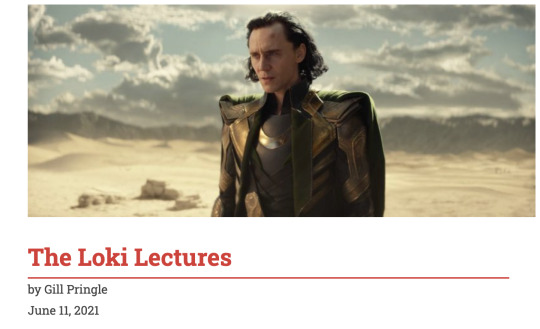
TW: mentions of suicide and also I’m an angry petty bitch
Yes I know this article is from like three weeks ago but I just found it... and I have things to say.
I swear I can’t handle this anymore...

“But today, Loki steps out of his brother’s shadow”... to step in another one. It be the TVA or Sylvie, just... take your pick.
“resuming his role as the God of Mischief” um where? when?
The comedy part is debatable but fine, whatever... I must have missed the noir crime-thriller bit maybe it was between two scenes of Loki getting his ass kicked by literally everyone in this show.

Yeah you forgot that end-credit scene showing Loki alive and well in IW/Endgame.
And no, alternate/variant Loki doesn’t count, he’s not the same person/character.

Because of course when you think of Loki you instantly think his story should take place in a “bureaucratic nightmare” -
And why not hire competent experienced people for Multiverse of Madness and Loki? Is this Marvel’s way of telling us they don’t really care about these projects?
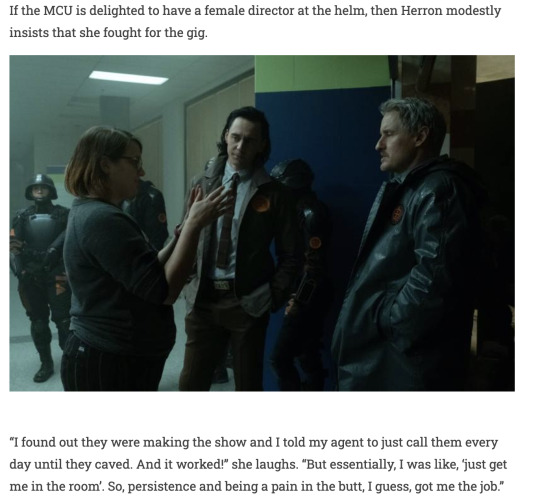
Kevin really said “no experienced writers on this project, let’s just hire whoever” - or maybe it’s a budget thing? Less experience means less zeros on the pay checks?

Wow, ok.
So not a fan of the movies nor a fan of the character, just a fan of the genre, that explains a lot...
“what was really important to me was stripping away all the fantastical elements” ... ?? I’m sorry?? What?? So removing all the fantastical elements from a show titled after who is supposed to be the main character who is a GOD and a prince from another realm/planet was what was important?? The Trickster God of Mischief, magic wielder, master of illusions NEEDED to be stripped from his FANTASTICAL ELEMENTS???
ffs
“find the heart of this story” - is the heart of this story Loki becoming best friends with his (mental and physical) torturer after what? 2 days? Was it falling in love with the ‘superior’ version of himself after only 13 hours together? I’m still looking for the heart of this story.
“what is the relatable message at the center?” - well apparently it’s ‘you can be a God and a warrior with magical powers but still get your ass kicked by literally everyone all the time and never use your strength and skills to fight back’. Or it’s the power of love, idk -
Oh wait, is it falling in love with the female version of himself? For a weird ‘love yourself’ metaphor? That must be it.
Or maybe it’s jet skis.

Ah yes, the ‘you can be good, actually’ message of this series that is so subtly presented to us...
They really missed the whole fucking point of Loki.
They missed it so bad they made him call himself a narcissist (which he isn’t btw).
For the record, Loki is a prince of Asgard who learnt one day he was adopted and in fact taken from one of Asgard’s worst enemies, the King of the Jotuns, aka Frost Giants “the monsters parents tell their children about at night”. He found out he was not only adopted but also abducted and not out of love. He feels not only betrayed but he thinks he understands now why Odin always favoured Thor and why he’d never have the same love from Odin that Thor has had his whole life. He thinks of himself as a monster and wants to be worthy of Odin’s love. So he tries to get it. And sure, he doesn’t do it in the best way, and yes, he is the villain of that story. But Loki isn’t a villain. He doesn’t like to make people suffer, he did it out of pain, out of hurt. The events in Avengers was after he was thoroughly tortured and coerced by Thanos to invade Earth. There is even a moment in the end when Thor asks him if he thinks this ‘madness would stop under his rule’ (or something along those lines) and he looks unsure and regretful. But due to the fear of Thanos and insecurity about himself (love is weakness or whatever) he keeps going. He redeems himself in Dark World, again in Ragnarok and yet again in IW and he was thrown in the trash for it.
Yes, Loki’s story is complex, but it really isn’t that complex... So maybe Loki is a “scared little boy” but his way of acting out makes sense and there’s a legitimate reason for it that was not explored in the show. And his backstory is probably what she called the “bells and the whistles”...
“we literally delete his universe” - and apparently you deleted his personality too
“it’s a story of reinvention ... can Loki find goodness in himself?” - again, you’re missing the point. Loki is insecure, but not about his ability to do what’s right, but about whether or not he is worthy of love! Finding goodness within himself comes AFTER!
“Loki’s journey, to me, is really about acceptance of himself” - several questions here, um, first, what about himself does he need to accept? That he’s a Jotun? The show never mentions it. That he’s done bad shit and should forgive himself for it? Give him a reason to. Self-love doesn’t come after being mentally and physically tortured by some guy who acts like he’s your best friend after 2 days of working together and being yelled out that “he can be anyone he wants, even something good”.
Show, don’t tell, isn’t that the point of your job?? The job you begged for??
Loki’s journey should have been about self-love and no, falling in love with the female version of yourself (who keeps saying they have nothing in common (because they don’t!)) doesn’t count!

“a more mature and darker path” ...
well this is interesting... was making Loki a clown and the butt of every joke part of making the show mature and dark? Were the terrible attempts at humour? Him being beaten up every two seconds? Having him say lines he’d never say in a million years just to be funny but since it’s out of character for him it fails completely? Was making him incompetent and a complete idiot part of that attempt of making the show mature and dark?
Is that why there’s no magic? You cut off the magician so your show would be more “mature and dark”?
Having him cry every episode doesn’t make your show mature and dark.
Loki from Thor, Avengers, the Dark World and even IW is mature and dark. Your Loki from your series is just a pathetic clown.
“don’t give viewers the story they are expecting” - I personally wasn’t expecting any story, I just wanted Loki, you know, in this Loki series, supposedly all about Loki, and you guys couldn’t even do that.
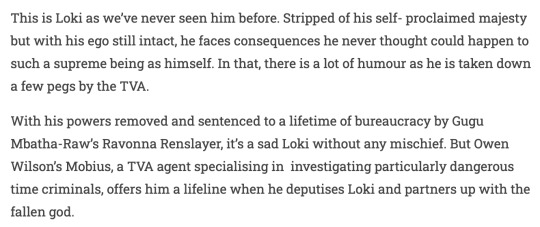
So this is the author of the article speaking here, I’m guessing, and I think they’re giving a summary of the show so far, so let’s break this down:
“This is Loki as we’ve never seen him before” - I 100% agree -
“Stripped of his self-proclaimed majesty” - ok, first of all, Loki is a prince, that’s a fact, he didn’t make that up, and for the few years he was King of Asgard disguised as Odin, he seemingly did a great job, so...
“but with his ego still intact” - ah, yes, his ego, you know, because he’s such a narcissist... oh wait -
yes he has an ego, but he has a regal one, not misplaced entirely either - his ego in the show is basically him underestimating the TVA and Mobius (as well as the Time Keepers) - his ego is him getting offended by the variant: the ‘superior Loki’ - his ego in the show is used as a weapon to humiliate and belittle him.
“he faces consequences he never thought could happen to such a supreme being as himself” - he literally tried to k*ll himself in the first Thor - literally a result of his own actions - when he returned to Asgard in Dark World, he didn’t try to pretend he hadn’t fucked up. He didn’t try to hide what he had done (he tries to deny to Mobius in episode 2 that he was manipulating them at the fair) - he sacrifices himself in IW... but sure, Loki from the series is indeed surprised that he is powerless (even when he doesn’t need to/shouldn’t be)
“there is a lot of humour ... he is taken down a few pegs by the TVA” ... he is humiliated by the TVA - definitely not what we were expecting, I’ll give you that.
“sentenced to a lifetime of bureaucracy” - definitely did not expect that either
and here comes my favorite quote: “it’s a sad Loki without any mischief”
yes - yes - yes
that is a good summary of this goddamn show, a sad, pathetic, powerless Loki without any personality
“fallen God” - yeah that’s definitely not what I was expecting either from the Loki series so good job on subverting expectations I guess...

“who is going to win out in this match between them?”
there is no match - Loki is powerless - he’s been turned into a pathetic docile harmless wet dog - Mobius literally mentally (episode 1 and 4) and physically (episode 4) tortures him, both time in an attempt to have Loki do his bidding - Loki is the dog and Mobius is the master - even when Loki ‘tries’ to manipulate him it fails because he’s underestimating them (by overestimating himself) - he uses obvious techniques to manipulate the TVA (episode 2) and nobody buys it because it’s not subtle at all! Loki is smarter than that, he is a TRICKSTER GOD FFS!
“there is an interesting dynamic between them that maybe you haven’t seen with Loki in the Marvel movies” - yeah, maybe there’s a reason for that... like... he wouldn’t... submit so easily... he’d be wary, cautious, cunning... he’d be... himself...

Sans déconner ?
It’s like whoever wrote the series didn’t actually know shit about Loki... like that wasn’t fucking obvious...
And those lectures were apparently done after the script was written so... again, no surprise there... we can see that

Well...
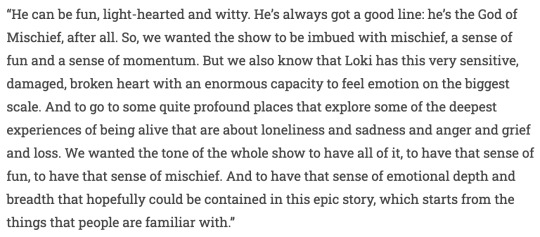
“we wanted the show to be imbued with mischief” vs “sad Loki without any mischief” choose your fighter
“Loki has this very sensitive, damaged, broken heart with an enormous capacity to feel emotion on the biggest scale.”
Are surprised that only Tom so far has portrayed and talked about Loki accurately?
“loneliness, sadness, anger and grief and loss”
I love this man.

I do wonder what Mr. Branagh thinks of the show...
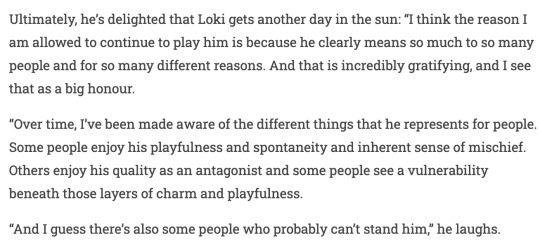
I’m of the people who see a vulnerability beneath those layers of charm and playfulness. I love Loki because he’s smart and cunning and regal, and elegant and sophisticated. I love him cause at the end of the day, he just wants to be loved, and he deserves to be loved.
And in the end, the only Loki I can’t stand is the one from the series.
43 notes
·
View notes
Text
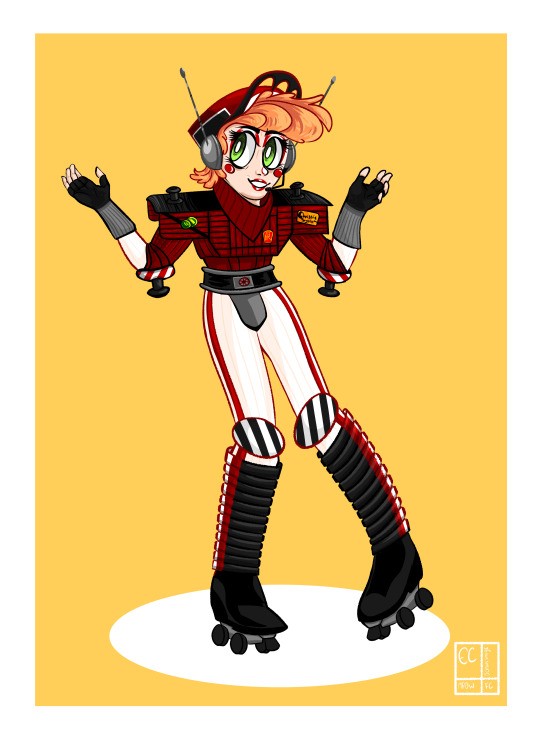
Stex Appreciation Month: CB!
Can’t trust anyone these days, remember I can face both ways!
Ah yes, my url’s namesake, i finally had time to finish and post something lol i’ll post the others soon
Questions answered under the cut! This is extra long because he is my Fave and im Biased
Fave song: There’s Me hands down, the whole scene including That Was Unfair is just so good in establishing CB’s, Greaseball and Dinah’s characters so well, plus the melody is just*chef’s kiss* and the fact that its technically a villain song?? Love that, plus the parallels of him finding Dinah alone and upset and comforting and supporting her and lending her a hand up and sending her on her way after she’s cheered up, with post race 3 where he’s the reason Rusty’s alone and hurt on the floor, kicking him when he tries to get up (looking at you 1991 boot) and mocks and insults him, leaving him alone with his confidence broken as he leaves laughing. What an absolute bastard!! But when There’s Me is taken out, you don’t properly see his two sides, both the bad and good sides are important to his character! He’s a contrary dude but that’s just him! Plus the actual song has one of my fave melodies of the show, I can and do listen to the intro from the ost on repeat, plus that lil bit in the japan vid?? So cute?? And the contrasting styles to that and Wide Smile?? Amazing, love it
Fave actor: Once again my fave actor list is gonna be like 5 people lol, the great thing about C.B’s material is that his attitude and demeanour can change based on his inflection, movement etc so! Michael Staniforth is a given, his Wide Smile really demonstrates his range which imo not many others have been quite as good, plus what extremely little footage and photos there are of him he was extremely expressive and just fun to watch! I’ll also go with Peter Rees, Andrew Prosser, Hans Johansson, Oliver Rhoe Thornton (and what the heck let’s also go for early Kapa Kitchen and Daniel Ellison)
Fave ship: Ohh boy this is super self indulgent but CBGB honestly (has the fandom given it a nickname? Greaseboose?? idk) I love that in the older scripts him and GB high five (that us boot where cb does a lil jump to hit GB’s high five?? Adorable) and actually talk like friends?? Like Greaseball is a jerk to pretty much everyone and for him to be friendly with him is just sweet. Not to mention its Greaseball who tells his gang that CB’s a “mean machine”, is always calling out to CB in the races and a recent thing that clicked in my brain is that when CB says “what a race, what a team!” and GB’s like “shhh! ohhh you mean me and dinah?” like did he just think that CB was about to out that they were working together during the race to crash the other engines in front of Dinah so he shushed him, then realised he was talking about GB and Dinah?? then just the whole exchange after sabotaging Rusty?? Duet One Rock and Roll? That GB just lifts him up like its nothing then they just kinda sit on eachother?? Those two are in cahoots I tell you!! Plus to me i get the vibe that they’ve been working together for years?? I just love their dynamic haha (and CB’s the only one i think who calls him GB that’s so cute) oh and platonic CB/Dinah is top tier, I feel like Dinah’s a very emotionally honest person so CB would feel like he could actually trust her?? And thanks to the new megamix Canoose/Elektra can have one right, as a treat
Fave thing about him: His independence! All the other characters are very much driven by either winning the races or finding love (or both), and C.B. just...doesn’t care. What you “are” is a big deal in Stex, like the engines, coaches and freight all have their identities shaped by their titles, and that can influence how they feel about the above two subjects “nobody can do it like a steam train”, etc and looking at when C.B. does participate in the races him and his partner tend to take the lead so he is good at racing!! But he chooses not to in order to make his own fun (at the expense of pretty much everyone else). He also seems to have a level of self-awareness, take his verse in Freight for example, he knows that as a brakevan he has to essentially serve the freight train, perceptually at the back of the train. But instead he uses his “purpose” aka his brakes to not do what he’s been told and to disrupt the train, and gets away with it by presenting himself as the innocent helpful brakevan! He’s just doing his own thing, (poor Rusty but,,) good for him!! And of course I have to say again, his two sides, and the ambiguity of it?? Like is he good, bad?? He’s both and neither?? An absolute force of chaos, but it only really works when both sides are present. Plus he a cutie tehe
Random headcanon: I think he’s unnervingly observant, even moreso than Pearl, and has amazing peripheral vision. That and taking notice of things like vibrations on the rails he’s very good at telling whose around before they’ve fully come into vision. He’s always watching everything around him, and isn’t necessarily being creepy, he’s just trying to get as much info on the current situation as possible. I think he likes to have some control and be on top of things?? I also really like the ex-boxcar theory (I first saw this theory on the old bellesdomain forums, rip) and I think that maybe when he was converted it was very difficult for him, having to deal with people, and having the CB radio to control what he hears helps ground him and keep his thoughts less cluttered?? He might’ve also forgotten a lot of his boxcar days, so when he says “you know I’m to blame but you don’t know my name” maybe he doesn’t even remember his original name?? And never got a new one as just the Red Caboose, so he clung onto the CB radio to give himself a sense of identity when his previous identity was stripped from him?? IDK
Unpopular opinion: This wagon can hold so many spicy takes he’s not a murderer lol but at the same time i can see where people can think that considering the lyrics reference several real-life train crashes even if they don’t make sense for CB to be there which tbh I put down to Stilgoe going tehe railway incident reference! I think he’s travelled around a lot and done a lot of questionable things, and maybe he was responsible for those crashes in the stex universe?? or maybe he’s just lying?? he’s definitely responsible for some shit, but considering he crashes 5 (!!!) engines during that one race night and being publicly humiliated after race 4 he doesn’t get in trouble and besides, all those engines are back for light at the end of the tunnel, they’re fine lol. Another thing is that I haaaate how CB has like no agency anymore in the current version like everything he does is for money, he’s basically a henchman for the engines (and everyone knows what his deal is and he isn’t in train jail?? what??) and they got rid of the pre-race 4 bit “just for me, I’m in this just for me” (in that slightly twisted there’s me melody) and Electra desperately pleading “help me caboose, help me caboose” to just the generic “I’ll help you win” at the end and not really its own little bit anymore like he barely has his own motivations anymore, it actually makes me really sad :( it really just doesn’t feel like CB anymore, though his character has been really disjointed since like 2007 when they got rid of there’s me. He’s just kinda bland now, like before he instigated a lot of the conflict, now others tell him to do something and he does it. I could like him more if he had an ounce more depth, like why is he so motivated by money? Maybe go into that old vs new tech theme and bring up that now that there’s new tech that can do the job of a brakevan he’s now antiquated and has to go into crime to get by?? Idk just please give me something, I think CB’s always been a bit of a fan favourite because he had multiple layers to his personality but new boose just has a whole lotta nothing :/
Anyway let’s end on a positive note at least we got pride lighting and a solo in the megamix so that’s something I guess XD
77 notes
·
View notes
Text
FNV Companion Meme: Hades
Found this on another’s blog and wanted to have a go using drunkle Hades! This’ll be the lone version without Bitesized or Tesla.
Template
General
Name: Hades
Location: Atomic Wrangler or one of the vagrant camps
How to obtain: Can be hired after completing the quest “King on His Own”
Character photo: I haven’t draw him properly yet, but I have this-
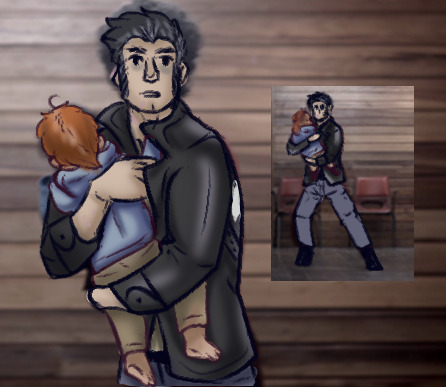
Companion Wheel
I think we should travel together: “You better be packing hydra.” / “Welp, better than lazing around here, I guess.” / (if courier is female) “Do I have to?”
Use Melee: “Shit, I’ll give it a go.” / “I can’t see straight, but a cleaver is a big knife. Bigger range and all.”
Use Ranged: “Does throwing dynamite count?” / (singing) “Shot-gun, sh-sh-sh-shotgun!~”
Open Inventory: “Come on, man. I’ve got a bad back!” / “Are you gonna pay me for this?”
Stay Close: “If I get in your way that’s your fault.” / (if female courier) “You better not be flirting.”
Keep Distance: (if male courier) “Nice view from back here!” / “Got it, chief.”
Stealth: “If you here cracking that’s my knees.” / “I’m more of a explode everything and run guy, but I’ll try.”
Back Up: (jokingly flirting) “Throw it back?” / I’m sure my muscles get in the way.”
Be Passive: “Ugh... really?” / “Yeah, that’ll last until withdrawal hits.”
Be Aggressive: “Now you’re speaking my language.” / “YEEEAAAHH!”
Use Stimpack: “Doesn’t hit as well as hydra, but it’ll do.” / “P is for pain... also Please give me more.” / (if female courier) “Don’t touch me. I’ll do it myself.”
Wait Here: “Oh. Don’t go too far, okay?” / “Oookay. Just don’t leave me here.”
Follow Me: “Right on, chief.” / “I ain’t a dog...”
Send to the Lucky 38: “Oh hell yeah!” / “You know I’m banned from the Strip, right?”
Send Home: (can be found where?) “Home, sweet home. Time to get high.” / “Finally! I missed Tesla.” (Atomic Wrangle/vagrant camp or Hades’ Shack after his personal quest is done)
Injured: “Uhghhhh... chief I ain’t feeling so good.” / “Hydra hydra.. hell I’d take a bit of jet.” / “Chieeefff! Helpp....”
Death: “Well... I was expecting this...” / “Oh, finally...”
Aggression: Aggressive
Confidence: Cautious
Assistance: Helps friends and allies
Karma: Neutral
Perks
What perks does your oc have? Generally companions have a starting perk and then two perks they may achieve depending on how the courier completes their quest line.
[Been Through the Wars]
Hades’ starting quirk adds 3+ DT and 20% resistance to drugs and poisoning.
[Cut off One Head]
If choosen the “Warrior” end to his quest, adds 25% skill points to the Explosive, Guns and Survival skills.
[Happy Homesteader]
If choosen the “Retiree” end to his quest, adds 25% skill points to the Medicine, Repair and Barter skills.
Drops
If killed, does your oc drop anything?
Tesla’s Note -A note from Tesla to Hades about their plans to party after “all of this” is done.
Shot In The Dark -Hades’ unique shotgun that has unlimited slag ammo.
3-6x Hydra 10-12x Dynamite Cleaver
Worn Kings’ Outfit -Hades’ unique version of the Kings’ Outfit
Ruined Dogtags -NCR dogtags with the details scratched out
Quests and Recruitment
How does the courier recruit your oc? Write a short description where your oc is found and if there are any requirements to recruit them as a companion.
You receive the quest “King on His Own” from Pacer after G.I Blues quest is done in the Kings’ favour. He speaks about a member of the Kings that had to be kicked out after “going psycho” from drug withdrawal. He says that this member was really impressive in a fight and he’d like to see him come back to them. Problem is, it’s impossible to get him to go sober, so he asks the Courier if they could do anything.
You can find Hades either in a vagrant camp (usually the one near the Strip) or the Atomic Wrangler. At first he’s very depressed and generally lethargic. Having high reputation with the Kings allows you to hire him as a companion, but first he asks you to track down 5 bottles of Hydra and some whiskey for his “happy time cocktail”. Upon doing this he’ll take this “cocktail” and suddenly become more upbeat and flirtious (if the courier is male). If the courier is female he’ll seem reluctant to join you, but does after a 25 Speech check.
Bringing him back to Pacer leads to Pacer being disappointed in Hades, but he requests that you keep Hades around for a bit longer to see if you can help. Agreeing to this completes the quest and hires Hades as a proper companion with his quirk.
Personal quests are an important part of developing our companions. What is your oc’s personal quest(s), and what are the different ways the courier can complete them?
After travelling for some time, there’s a random chance you’ll witness Hades going through withdrawal. He’ll become very depressed and easily angered, fighting anything that comes within his perspective. Talking to him will give you the option of giving him Fixer which prompts him to open up more about himself.
He reveals he was born in a Vault set underneath an Arts Theatre. The musical scripts found in it is where his tribe gets their names from; he’s named after Hadestown: The Musical. He left his tribe as a young adult to seek adventure but was captured and sold into slavery.
He refuses to go into anymore detail. Passing a 50 Speech Check he’ll reveal that he was sold to an older women that lived in this fancy condo for rich people. He’ll shudder at the memory then end dialogue.
This prompts the beginning of his personal quest, “Why We Build the Wall”.
After completing three quests for the NCR, Hades will mention his distain for the NCR. Through dialogue it’s revealed he was a soldier for them but deserted during the Bitter Springs Massacre. Talking to Captain Gilles with Hades in the party will prompt a conversation between the two. Gilles is disappointed, but not surprise that Hades deserted them while Hades is bitter and disgusted that they’re still here. You can resolve the conversation peacefully with a Speech check of 30.
After becoming Liked by the Legion this prompts a conversation with Hades. He is neutral towards them, saying their slavery is horrifying but at least they protect their citizens. He says he’d rather join an honest evil than a dishonest good. You can then ask him about his time as a slave. Reluctantly he reveals that his owner would beat and assault him whenever something upset her. He’s biased against women because of this (something he apologizes for if the courier is female). He is gleeful as he reveals that he escaped after she had a heartattack at a party, but quickly becomes subdued again as he’s been wandering every since.
The last condition needed is to complete the quest “High Times” with Hades in the party. Upon completion he opens dialogue mentioning he drinks and uses drugs to forget his past. He says his companion, Tesla, is a complete amnesiac due to her excessive drug use and he’s kind of been hoping to have that happen to him too. But everytime he has a withdrawal, all those feelings he’s been bottling up just come out and start the cycle over again.
Through dialogue you get two choices to help him.
The “Warrior” end, has him continue to use drugs now adding in Buffout to help control his withdrawals. He becomes tougher and buries the past completely.
The “Retiree” end has him use drugs at a half dose, using more Fixer and visiting the Followers. He regains more skills and unlocks his Shack where he gives you supplies like ammo and different crafting scrap.
Ending Slides
Another important part of companions is their ending slides. How do their endings change based on how their quests are completed and how the courier decides to handle the world around them? Below is a short template listing the different main story outcomes. Feel free to change whatever you need to fit your OC’s story.
If their personal quest is never completed…
Hades, ever drifting between highs and lows, remained a vagrant to the very end. Haunted by his past, body deteriorating from alcoholism, he took his life outside of the Strip’s Gates: a symbol of how the Mojave can chew one up and spit them out.
If the Courier sides with Legion and Hades quest is completed with the Warrior Ending
As the Legion marched into Freeside they rounded up the drug addicts and vagrants. Most were executed on sight, some, like Hades, showed a battle prowess that impressed Caeser. Hades was cast into the Arena and after many battles, was finally slain. His body was burned in a sign of respect.
If the Courier sides with Legion and Hades quest is completed with the Retiree Ending
Hidden away in his shack, Hades escaped Legion sight for a long time. Upon finding the now sober Hades, they captured him and sold him to Aurelius of Pheonix (or Lucius if Aurelius is dead) as a repairs specialist. Though once again a slave, Hades accepted his fate and eventually passed of natural causes.
If the Courier sides with NCR and Hades quest is completed with the Warrior Ending
With the NCR taking over New Vegas, it wasn’t long before deserters were brought to justice. Hades refused arrest and fought until the very end, taking out many NCR soldiers in his wake. He eventually went down under a hail of bullets, screaming his bitterness to the skies.
If the Courier sides with NCR and Hades quest is completed with the Retiree Ending
With the NCR taking over New Vegas, it wasn’t long before deserters were brought to justice. Hades was brought before a trial and accepted his imprisonment. He lived out the rest of his days working in the mines, eventually dying in a mineshaft collapse, surrounded by other Kings.
If the Courier sides with House and Hades quest is completed with Any Ending
Hades, like many vagrants in Freeside, was either ignored by Mr House or shot down when his robots came strolling into the town. Being a friend of the Courier, he was left alone by other factions in Freeside; leading to a lonely, if peaceful, life.
If the Courier makes New Vegas independent and Hades quest is completed with Any Ending
Along with the other Kings in Freeside, Hades ruled and enjoyed a free life. In the chaos he often relapsed into using more dangerous drugs and whored himself out without care. Eventually, he passed after a bad, violent trip on pyscho which lead to him being killed in self defense.
8 notes
·
View notes
Photo

“Two Minutes” | Directed by Tucker Gates, Cinematography by Giorgio Scali
[This week remained hectic as heck so we are keeping the more casual format. --Sara]

Sara: Opening (or closing) with a Carrie mirror shot is classic Homeland and I love to see it! She looks very tired. I hope when the series is over, Carrie takes a long nap. But not, y’know, the LONG long nap.
Gail: If this shot is a look into her current emotional state, which I think it most definitely is, she looks tired but determined. She hasn’t been out of that rehab center for very long, you have to wonder how her medications are working, because it’s clear she isn’t getting enough sleep. But good God--Claire Danes is gorgeous!
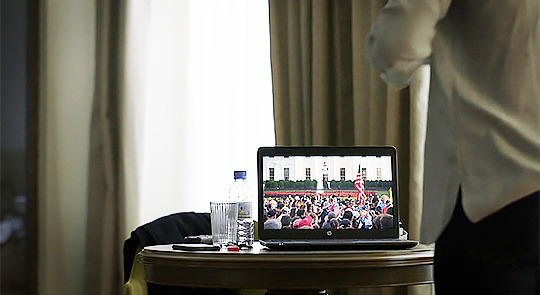
Gail: When I watched this scene I had a few realizations. At first I thought the red thing in front of the water glass was a pill but when I zoomed in it looks like floss. Then it occurred to me that we haven’t seen Carrie taking her meds or listening to jazz this season. This version of Carrie seems very stripped down (no pun intended). No mentions of seeing her family or FaceTiming Franny either. I don’t know what any of this means yet, but pointing it out for future context.
Sara: Floss? Whoulda thunk? I love this very obviously photoshopped (or whatever the video equivalent of that is… CGI?) scene of “mourners” gathering outside the White House.

Gail: I loved this opening shot of Max with his back to us... much like the donkey at the end of the episode, he has the flight recorder strapped to his back via a backpack and he treks uphill. I love the pop of color from the flight recorder and Max’s backpack in this desert-like scene. The importance in this shot is all about knowing where the flight recorder is and less about who is carrying it. Although I’m sure everyone joined us in a sign of relief to see Max still alive!
Sara: Chekhov’s flight recorder! I’m thinking of other significant objects on the show (like Brody’s vest), but none have gotten the attention that this dang flight recorder is getting. Also, Max writing his name in sharpie on his backpack is big younger child energy.

Sara: As someone who wears glasses, I really admire that Max is always, without fail, wearing his. No matter how sweaty he is. I love you, Max!
Gail: It is very interesting how every time Saul is kidnapped, his glasses are taken from him, but Max gets to keep his (for now at least?). Maybe there is a metaphor there about how Max isn’t losing sight of the bigger picture?
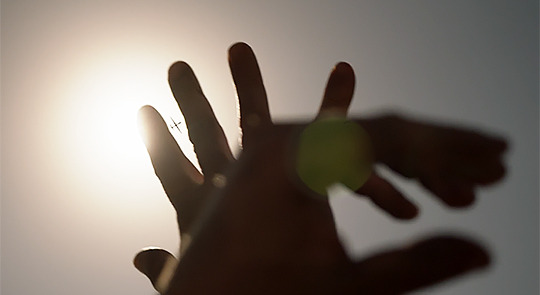
Sara: IJLTP, and it’s the first of a few POV shots this week. Max really is like an audience stand-in and this makes it even more literal.
Gail: IJLTP too! Such a great shot.
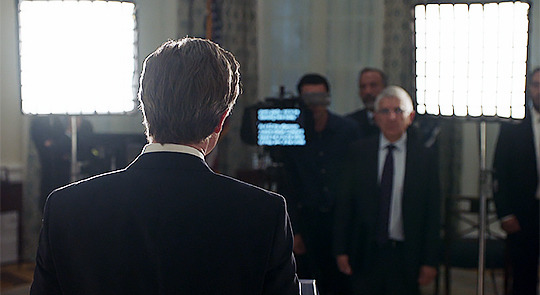
Sara: They had a shot very similar to this in Keane’s speech from “Paean to the People.” I really love how you can see how very manufactured this all is. Not that any of us need to be reminded of that…
Gail: The focus of this scene starts with the people behind it. I love that, because while the President is what the people are watching, he’s getting his cues and information from everyone else. In “Chalk One Up” we saw the theater of the peace announcement. Here we see the theater of the new president making his first speech. It’s all just words until the intentions behind them are realized.
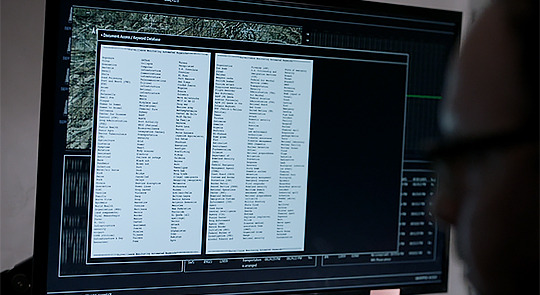
Sara: Some of the keywords here:
Bust
MARTA (the “mass” “transit” “system” in Atlanta… where my Atlanta homies at?)
Body scanner
Narcos
Influenza
Plot
Gail: If these keywords are a part of the search for Max, shouldn’t his name be on it? Or American? No wonder Carrie was pissed! Get with it, Lonnie!

Sara: I know this is a stunt double, but it’s still meant to be Carrie, and Carrie riding this motorcycle so awesomely is one of the most badass things about her. We have no choice but to stan.
Gail: What a cool payoff to all of the scenes and allusions of Carrie leaving the station undetected. Girl is resourceful, no doubt.
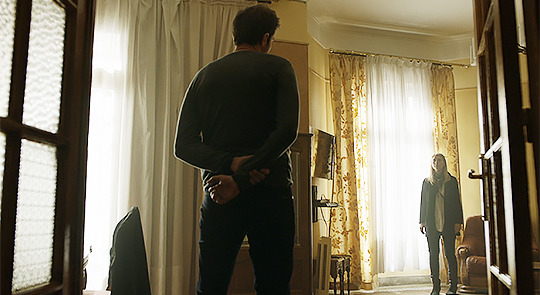
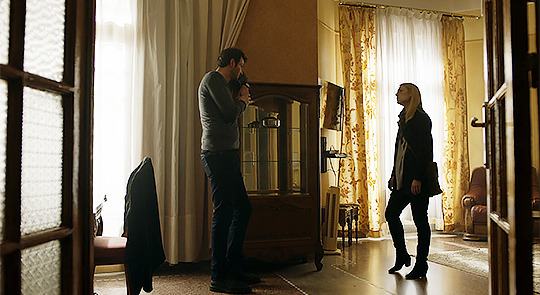
Sara: Are these wide shots so that Costa Ronin, who is apparently nine feet tall, and Claire Danes would both fit in the frame? Also, “I just like how he leans.”
Gail: I think the shot might be indicative of their power dynamic. But I agree with you, Yevgeny’s consistent nonchalance is such a great character detail.

Gail: Interesting that by the end of their scene, Yevgeny sits down, making his body language less threatening. He enjoys these games with Carrie a little too much for my liking.
Sara: That smirk…
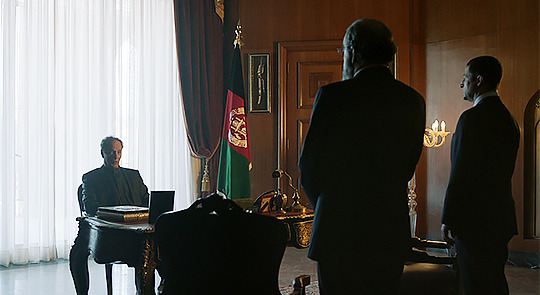
Sara: The framing here is really interesting. G’ulom sitting casually while Saul and Scott Ryan stand stick straight, almost obediently (ironically), is really striking. G’ulom has these almost angelic white curtains behind him while Saul and Scott are cloaked in shadows.
Gail: This feels different from Yevgeny’s casual nonchalance. I get the sense here that G’ulom is sitting out of lack of respect for the people standing before him. G’ulom turned his back on platitudes the second he turned his back on Ambassador Gaeto in the opening of “Chalk Two Down.” He only stands at the end of the scene to exert his power over Saul and General Ryan.
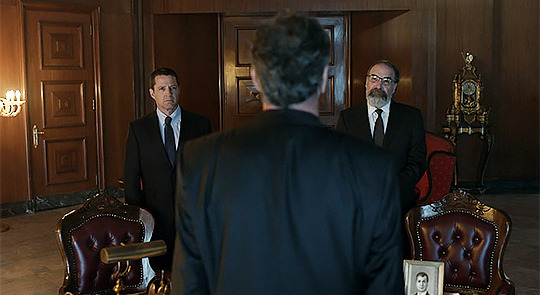
Sara: And then this shot, which is incredible. Centering G’ulom in the frame really emphasizes his power.
Gail: Such a great POV shot to see Saul and General Ryan’s reactions to G’ulom.
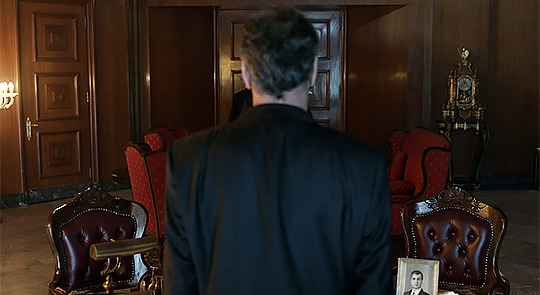
Sara: ...and I love the specific choreography of Saul and Scott both exiting so that their bodies are hidden behind G’ulom. I feel like Homeland doesn’t do shots this stylized that often so when they do it feels all the more impactful.
Gail: I find it so interesting that G’ulom has turned his back on the audience too.

Gail: I love the glimpses of the relationship between Mike and Jenna. Is this how Saul and Carrie started out?
Sara: Oof, ya think? I didn’t even think about their relationship in that context (maybe because the age gap is not as great) but now that you say it... I find it a really interesting way to shoot this, almost like we’re eavesdropping on them eavesdropping on Carrie. I love when Homeland returns to themes of surveillance.

Sara: Why onions? Because we’re peeling the layers of this story. (I’ll see myself out.)
Gail: OMG, Sara! You are right, they are onions! I’m ashamed to say I thought they were beets. (Thanks, Dwight.)

Gail: When Fibrooz, Max’s captor, reaches for Max’s wrist in this scene, I thought he was going to unlock the cuffs. Doesn’t bode well for Max that this guy is all about making a buck.
Sara: Major Carrie in “Why Is This Night Different?” vibes. The framing is almost identical. This continues some of the role reversal of Carrie and Max this year.
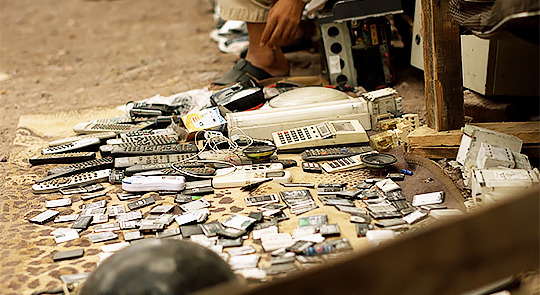
Gail: I love the details in this shot and the one of the market shelves. It looks like a random assortment of remotes and calculators and jars on shelves, but it’s actually very organized.
Sara: Are they selling remote controls without the TVs that they control?

Sara: Chekhov’s flight recorder strikes again! Sorry, I have nothing intelligent to say about the device of this damn flight recorder because I find it so freaking hilarious.
Gail: I love how we are seeing the journey of this flight recorder and all of the different people who are getting their hands on it.
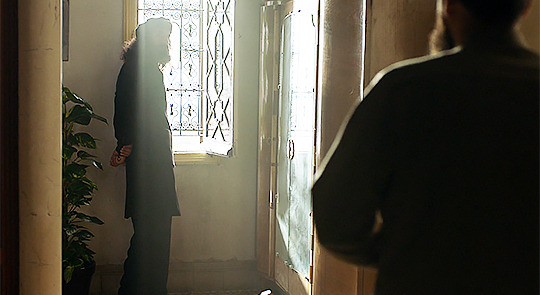
Sara: This show is really making me feel sympathy for Haqqani, which is completely wild. Look how he’s softly dressed in the light here. Total character rehab happening this season on all fronts. Numan Acar has infused him with a real weariness and softness that’s added so many new layers to what was once just a classic villain.
Gail: I agree, Numan Acar has done an outstanding job with his portrayal of Haqqani. The writers approach to softening him has paired wonderfully with the direction of the show and has led to great shots like this of Haqqani, the man and father.
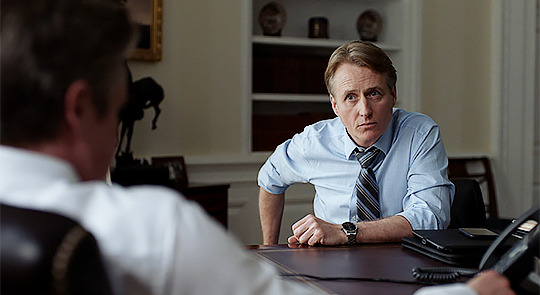

Sara: Gail pointed this out on the podcast. As the conversation progresses and Hayes veers off script he literally turns away from Linus. Subtle but effective. The use of body language this season has been pretty great.
Gail: The choreography has been fantastic, I agree. Wellington has ditched his suit and has rolled up his sleeves. His calm demeanor and thoughtful counsel that we’ve come to know about him is clearly about to be tested.

Sara: IJLTP.
Gail: When one door (seemingly) closes, another one opens.
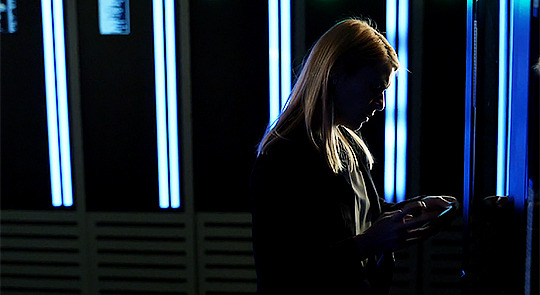
Sara: IJLTP.
Gail: The blue lights behind her are gorgeous.
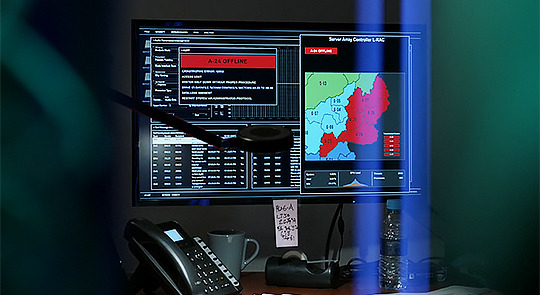
Sara: “CATASTROPHIC ERROR”
Gail: The details! And much foreshadowing!
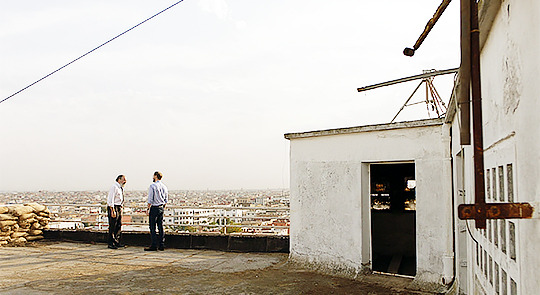
Gail: Things start out friendly and at a distance and then we rapidly move into tighter shots as Mike reveals to Saul just how bad the optics are for Carrie right now.
Sara: This is such a lovely shot and I love all Homeland rooftop scenes. Sometimes Carrie’s smoking, sometimes she’s having a panic attack, sometimes both things are happening at once. See how I turned this into a thing about Carrie?
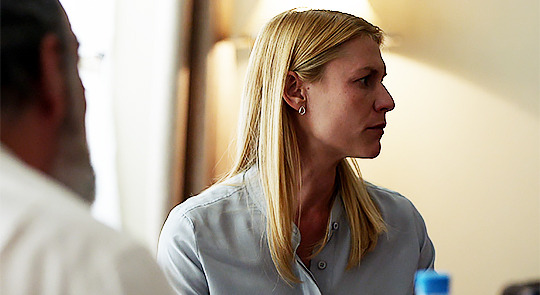
Sara: I don’t know if this is a new choice by Claire, but recently I feel like Carrie has a habit of literally turning away from difficult conversations. Anyway, this Carrie/Saul scene was incredible.
Gail: There has been a subtle shift to her personality this season. It must be hard to face her new reality and looking at Saul has to be one of the more daunting reminders of what it used to be.

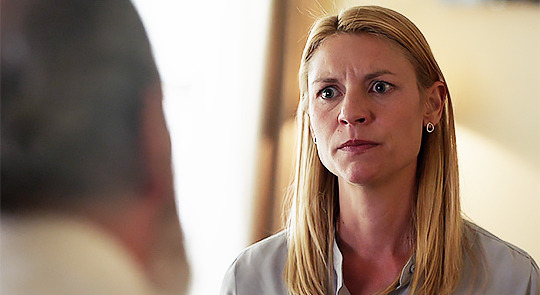
Sara: It struck my while watching (and rewatching and rewatching) that Saul is literally the only human on the planet who could have this conversation with her. He knows when to push and when to relent, when to raise his voice and when to lower it. He really does manage her. Likewise, she knows when and where to strike. It goes without saying that Claire and Mandy are incredible here. This scene is really a testament to how invaluable the foundation of watching two characters (and actors) develop a relationship, in real time, over ten years, is for the audience. It massively enhances the performances and the dramatic weight of the scene.
Gail: Sara!! You are buying into my Ivan/Saul convo theory (from “A False Glimmer”)!! I agree with everything you said and would add that with all of that being true, Saul can’t possibly think Carrie is getting on that plane back to rehab willingly.
(Sara: Guess he should have gotten the handcuffs then...)

Gail: What a stunning shot. I gasped when I saw it. Not because Haqqani was turning himself in. That I expected. But how Carrie witnesses it and reacts to it. The last time Carrie was that close to Haqqani she almost shot him. I Khan’t believe how much things have changed.
Sara: Gail, khan you not? Anyway, I agree, it’s a stunning shot. I can’t properly articulate why I love it so much so: IJLTP.
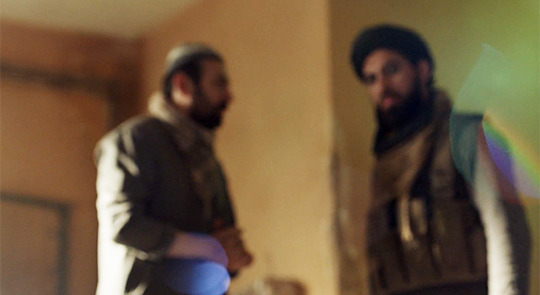
Sara: I know the show did something like when Carrie woke up from being drugged in “Why Is This Night Different?” I won’t check, because I don’t care to revisit that episode ever again. Gail, can you verify?
Gail: They did and it was eerily similar. Big difference though: Quinn was saving/protecting Carrie and Fibrooz is most definitely not doing the same for Max.
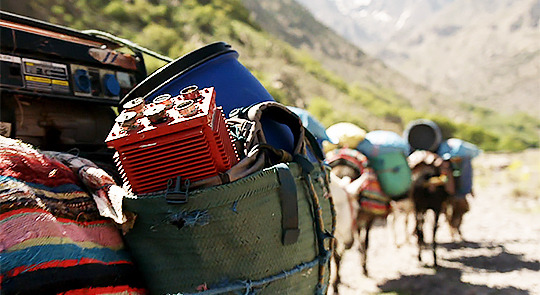
Gail: The bookend to the opening scene with Max. The flight recorder has made its way into another backpack, heading up a mountain. I LOVE the color in this scene and how the flight recorder is on a JOURNEY.
Sara: Quite possibly the funniest scene on this show ever.
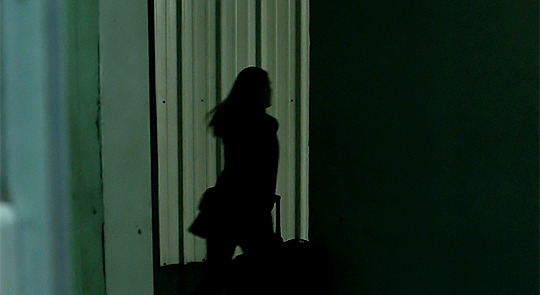
Gail: This spy is heading into the cold...
Sara: “Carrie, no!” … “CARRIE YES!”
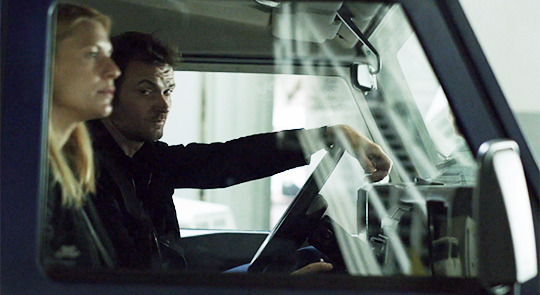

Gail: Yevgeny’s (partly faux) nonchalance (he sneaks a peek!) and Carrie’s focused stare say so much without saying a word. No looking out the window for Carrie this time, we know where her mind is at.
Sara: Carrie stares straight ahead. Yevgeny can’t help but turn and look at her. Truly iconic. I know I say that about everything, but this really is I-CON-IC!
5 notes
·
View notes
Note
Hi! Can I ask question about the movie Paris Texas? I am not sure if youre the right personbut i have always wondered why it is so highly revered. Like I liked the movie, i thought it was good. i could feel the longing the characters are going through, i liked how it was shot(?),i can see why the 'booth' scenes are always replicated in music vids & other shows & stuffBut idk what makes it iconic- like everytime i listen to people talk about films, they bring that movie up.
my favorite actors and directors for around the world even mention that filmLike i enjoyed it and know its good, but i am not sure on what makes it great. what are your thoughts on this film?
ahh hello! lmao im so happy people are asking me to talk about film lmao this really does excite me. and im so glad you came to me with this! just in general! thank you!
trust me like...i get it. paris texas is a great film, and i did enjoy watching it, but i see where you come from. i can understand why its been so revered, so hopefully i can shed some light on that for you. but! i really do understand where you come from. if im honest, theres a lot of flaws and issues with the film. its slow, doesnt actually handle the heavy themes the script attempts to portray very well, and doesnt really actually offer any nuance to janes character. shes actually a really complex character, but shes boxed into the role of like...the manic pixie dream girl, except not that. shes not and ideology of freedom or growth or perfection the way that trope is usually portrayed. instead she exists to further a male centric narrative and the depiction of women is really shallow, so trust me i get why there is a dissenting opinion.
that said, there are a lot of things that make the film as cult and important as its become among cinephiles. they range from the use of americana as a plot device, colour theory, voyeurism, the breakdown of the american dream, etc. ill be breaking down some of the major points here under the cut, but there are even more ways to read this. and!! i stress!! it is ok to read all of this and still disagree! thats the beauty of film studies.
to really understand fundamentally why this film is so important we need to focus on two intertwining notions - that the film is a portrayal of america and this portrayal of a america is coming from a foreigner. the director of the film is win wenders, a german filmmaker, who has always claimed to be fascinated by the history and character of america. effectively, america itself becomes a character within the film. it does not matter that ‘america’ is the backdrop - it plays such an integral role in shaping the narrative of the story, one could argue it has more autonomy than jane. take for example the opening scene - it opens with the scene of a man walking aimlessly through the desert with a gallon of water - nameless and aimless. from this very first moment, we are presented with land. an endless expanses of land in which there is no real ownership; from this moment, we are meant to understand this america shapes the lives of its people as much as this perspective on america is shaped by the director of the film.
furthermore, if we consider the opening shot; the saloon; the fact that a full 26 minutes elapses before the main character says a single word, we can argue the mise en scene within each of these scenes a visual alignment to the classic genre of western cinema. here, too, in this genre is the stress on land as it relates to and symbolizes the importance of freedom, autonomy, and identity, but moreover is there a stress on the notion of the anti-hero. by cultivating this understanding of america and the western, we can immediately align travis with the failed man, the failed husband, a failed owner of land, and a failed dream.
but...did he fail? or did the notion of americana and the american dream fail him, instead? this seems to be the case as we considered the continual use of americana references. one of the fundamental aspects of americana is the nature of nostalgia - americana is traditionally idealized as the desire to return to small towns and cities from the turn of the century. the hope of creating a home, only for that essence of home to be lost; the period of exploration from 1820 to 1880, and then the comfort of being settled from 1880 to WWII. these are the fundamental aspects to understanding americana but they are foundational in the nostalgia that drives the narrative. aspects like: a barber shop, a diner, route-66, etc these small town notions are the driving pieces of nostalgia. and these are the elements of nostalgia that generate the plot device of paris texas.
im taking a moment here to really stress the following: western films and the concept of americana is inherently problematic. it exists on wester colonization, appropriation, and genocide. americana is a white-washed version of history and that, explicitly, is why all the elements of americana, nostalgia, and the american dream fail within this film because, again, it is america from the perspective of a foreigner and the perspective is profoundly unforgiving.
(also, like, i literally hate western films because they are so racist and sexist and hyper-masculine, from any historical or modern perspective, so again...me being me saying i understand why you might have had a hard time with this movie lmao but when you realize this is not speaking in favor of those things it kind of hits you like...oh, damn. like, imagine this film from the perspective of a white american male, you know? travis would be a king, someone admired rather than someone youre not even sure you like or tolerate by the end)
right! so! now that we understand how important the elements of a failed america and american dream are to this film, we can see how nostalgia continually presents itself - not for a home lost, but for the hope and the opportunity lost. consider: the colour, the wide, open expanses of land (could have been owned, but are entirely empty), the way characters gaze at their own reflections - hell, the conversation between jane and travis at the end, double sided mirrors, jane forced to look at herself in the mirror while travis looks at nothing because its his memories and his memories are presented at a visual and emotional distance. memory presents itself through illusions, reflections, and disorganized narrative structures - it is not that they cant remember, but that they want to remember without criticism. this comes to a head when they view the home movies, another example of how life was or could have been - how it was supposed to be, and the sudden confrontation that it very much is not that.
primarily for me, the thing that makes me enjoy the film (apart from realizing wenders has an extremely unforgiving view of america) was the colour theory. you cannot talk about this film without discussing the colour. the predominant tones in the film are red, white, and blue - americana and american flag. but why all the green (i.e the doctors office)? why the isolated events of solid red (i.e the strip club)? well, green and red are put perpetually at odds with one another. green, a usually soothing colour, is subverted to denote internal conflict; red, becomes regret, falsehoods. the colours in the film exist to at a sub-textual layer that speaks for the characters when they refuse to speak for themselves. and by the end, the colours return to a normal palette. black, beige, tan - travis recounting their history to jane in a room that is natural. things are finally exactly as they are meant to be, the intense colours of their emotions faded by distance and time, and forced now to confront their truth.
but still...the elements of voyuerism exist. because he can see her...if he chose to. she cannot see him. she can only see herself. and so we are left, then, understanding that there is no hope. no connection. the achievement of the american dream is a falsehood of nostalgia that exists to drive our motivations, forcing us to live in a time or a place or a hope that never once was tangible, but craved just the same.
#i hope this helps you understand WHY its considered incredible#but remember theres a large number of films#EVERYONE obsesses over that i personally despise#this is just why#doesnt have to be right for you tho!#the joy of film#and any practice really#is the ability to praise a film you love and ensure it gets a place in history#if its great to you then it is great <3#ahgishaman
2 notes
·
View notes
Photo
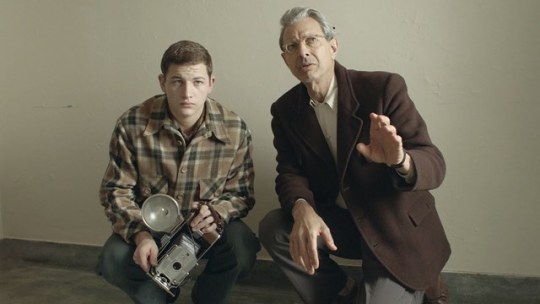
America Lobotomized: The Rick Alverson Q&A.
“If I have any value now, my responsibility lies in nurturing the limitations of cinema and making them apparent.” —Filmmaker Rick Alverson chats with us about the irrelevance of ‘consumer cinema’, the fascinating failure of masculinity, and causing trouble with Jeff Goldblum.
Musician, writer and director Rick Alverson makes the kind of films that are, as Letterboxd member DirkH enthuses, “hard to love and impossible to enjoy”. One of the decade’s most challenging directors, his confrontational style is take-it-or-leave-it, but those who like to take it find something deeply profound in his take-downs of concepts like the American Dream.
Alverson’s newest feature, The Mountain, departs from the ironic realism of his earlier films, creating a lushly immaculate, desolate poke at American society. Set in the 1950s, The Mountain is loosely based on the controversial American neurologist Walter Freeman, here represented as the fictional Dr Wallace Fiennes.
While Alverson’s earlier films have tapped into the twisted comic talent of Tim and Eric (and friends), The Mountain uses the hefty star power of Jeff Goldblum (also a Tim and Eric alumnus) against itself, with Tye Sheridan (of the vulgar mime act in Alverson’s Entertainment) as a mostly wordless photographer who is selected to follow Goldblum’s Dr Fiennes on an asylum tour. French great Denis Lavant appears as an unconventional healer, in one of his few English-language roles; Alverson unleashes him at will.
“A rigorous, alienating work about the rot at the core of the nation”, The Mountain divided audiences when it premiered at Venice last year, and divides Letterboxd members still. “Easy answers don’t always have to be there,” writes Allison, “but it quickly became pointless and even monotonous.” “A modern master is at work,” counters Tyler. “It’s rare in these times to find a movie so precise. Every cut reveals a wonderful new, immaculately composed shot.”
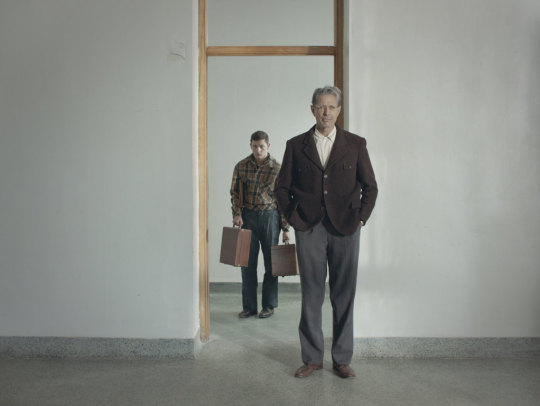
Tye Sheridan and Jeff Goldblum in ‘The Mountain’ (2018).
Can you talk about when and how you got the inspiration for the premise of The Mountain and why you felt now was the right time to make this film? Rick Alverson: I’ve had an interest that I’ve explored since The Comedy and Entertainment where I’m trying to comprehend what fuels this blind propulsion of American progress in today’s political climate, where we’re romanticizing the white male privilege era of the 1950s.
It’s also something often romanticized in American cinema; if not in its subject matter, then it’s romanticized in its formal depiction. I wanted to take that on and watch it deflate and see how it would hold up to a more nuanced and muddy immersion of the era.
You’ve described the film as anti-utopian. Do you think nostalgia is a dangerous thing? Nostalgia is definitely a very rich intoxicant that’s difficult to pull oneself away from. Commercial American cinema peddles almost entirely on those triggers of compartmentalized representation and clean—marginally pornographic—singular dimensions. I find that troubling to some degree because it pretends to be something else.
The remake of The Lion King kinda sums that up. [Chuckles] Yeah.
Toxic masculinity has been central to many of your films and it’s in many ways the enemy of the moment right now. You’ve been ahead of the game in a way. Is that always your starting point? What influenced you to focus on men at their worst? I was raised at a time with influences that come from particular periods so there was a binary presentation of masculinity and I think it’s something that men are mired in. That has been problematic for men in a way that stripped away the wholeness of an individual.
Frailty, or a nuance of communication, hadn’t been as accessible to a generation of men, and that crippled them in a way which inflamed the damage that they did in their privileged space and [for] everyone around them. It’s a cyclone. In my demographic, we have been exposed to that, caught in it, and wrestled with it. Maybe that’s why I look at it so much.
I find failure in masculinity fascinating, too. The problematic American ‘wandering cinema’ of the 1970s is what made me want to do what I do. It’s the great unsung song of cinema that fell out of favor by the 1980s.
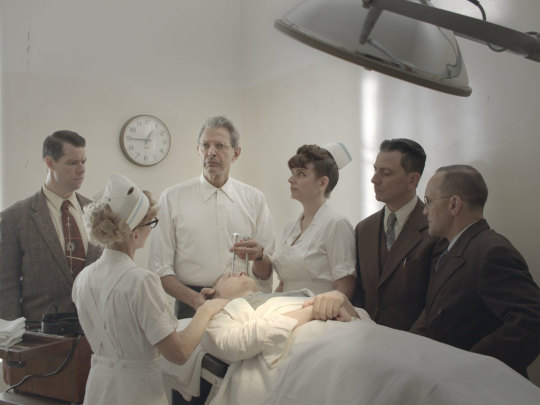
As a working American filmmaker, do you feel it’s your social responsibility to use your medium to comment on and expose what you’re seeing happening in this country? Is this your version of political activism? [Laughs] Maybe. I think that there needs to be a politics of form. It’s the responsibility of filmmakers to not be ignorant of this gesture and what it does to the population. There’s a responsibility of cinema to ask itself some very hard questions before it ends up wrapping into total irrelevancy. What is narrative? What value does it have? How is it destructive? How is it being used for destruction? Is it functional anymore? I think that a lot of consumer cinema doesn’t ask those questions because it’s afraid to expose its vulnerabilities or its potential irrelevance.
How did your experience with Entertainment affect your approach to The Mountain? Entertainment was the first film that played with cinematic influences that I had. It played with things that kind of grossed me out in cinema, with the defaults of metaphors and symbolism to create false profundities.
With The Comedy, I was focusing on a subset of class privilege in nuclear centers like New York City that I find reprehensible. I wanted to engage with it, investigate how to understand it, and make myself uncomfortable. Suddenly the medium felt a little more vital to me. It wasn’t just a propagandistic grandstanding, where essentially I would be showing off my likes and dislikes. I try to play a cat-and-mouse game with my own comfort and hopefully the audience finds some vitality in that.
Your last two films have felt very surreal, stylistically. They’re more lush yet still quite detached. What’s compelling you to stray from the slice-of-life realism you were using with your first few films? I had always wanted to have a career working with non-actors, but as I’ve gradually become more interested in the problems that make me uncomfortable I find myself engaging with them head-on, instead of just ignoring them for my comfort zone. The unreality of cinema has also become increasingly interesting to me.
There are some obsessive-compulsive approaches I took in The Mountain, which viewers might not see off-hand, that sort of heighten that falseness. Nobody leaves or enters the frame unless they go through a door. I’ve padded and loaded the film with limitations and, if I have any value now, my responsibility lies in nurturing the limitations of cinema and making them apparent.
For a long time we’ve been living in a fantasy land of unlimited potential and an abundance of opportunity, but the fact of the matter is we’ve been ignoring the beauty of the finite quality of the world. I think the same thing goes for cinema.
You’ve mentioned before that you don’t usually stick to a script but you did this time, though obviously the film utilizes a lot of long pauses and still imagery. Do you map out this sense of pacing in the script, or is there an element of you finding the film in the editing suite? How important is the sense of discovery in post for you? Editing the movie is incremental in its own way. But for me, the film really becomes alive during production and I find the pacing there. As far as mapping out those things in the script goes, it’s an obligation that I find tedious sometimes. My scripts used to be very short but they’re longer now because they’re a little bit more traditional on the page.
I do relish the moment when something isn’t satisfying our expectations. There’s a very exciting moment there when you let the comfort of distance go on too long. If you curtail it in the right way, it’s like surfing.

This is a reunion between you and Tye Sheridan. He’s grown a lot since Entertainment, very literally too. Yeah, at least 4 or 5 inches.
Was he your first choice for the role? How did he contribute to the film beyond what you and your co-writers had on the page? He was my first choice and we developed the film together. It was an idea I brought to him when Entertainment wrapped. I talked to him about playing a ‘black hole’—something neutral at the centre of everything—that the whole world would move around.
He has a tremendous amount of patience and generosity. He’s very disciplined and we had a lot of fun subverting some of his capacities for empathy and fragility as an actor to make him inaccessible. That was a mission statement for us.
His character is very literally an audience surrogate. He’s passive, then he becomes pacified. I’m wondering what that says about what you think of your own audience? Do you feel unheard and misunderstood? It’s hard to say. I guess we’re interested in the reception of the film because I do want to engage an audience and there’re all sort of experiments in flirtation of audience expectations—in a constructive sense, I hope.
I do think that audiences have been conditioned to prefer pacificity and media as an anesthesia. I’m trying in my little way to interrupt that. Maybe I’m just having a fit in the corner of the room, I don’t know.
So how did Jeff Goldblum come on board? I was very surprised to see him attached to one of your films, unless I’m underestimating his taste in modern arthouse cinema. He’s getting in the mud of it all. He’s up for anything these days. I think he’s having not just a popularity revival but a revival of his artistic interests. Jeff has a tremendous amount of vitality and he was very interested in causing a small trouble with me.
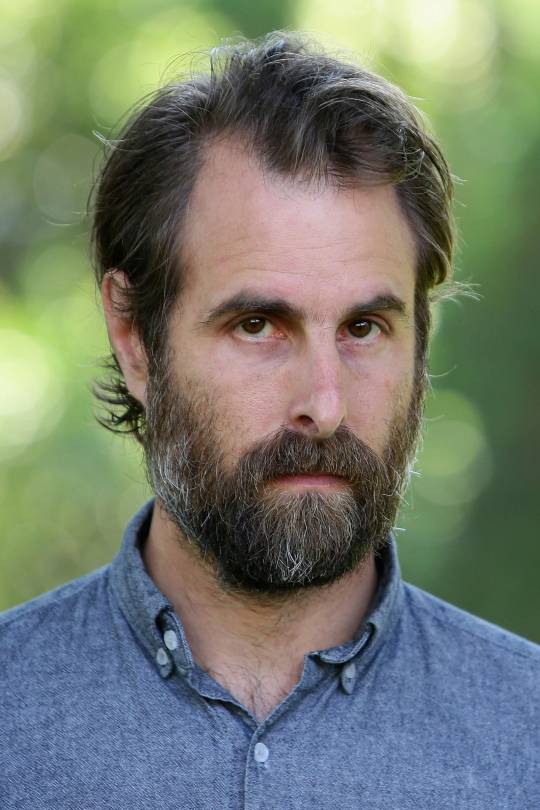
Director Rick Alverson.
In what way? He wanted to subvert expectations of the audiences of how they’ve considered him and what he does for them and we utilized that. He’s really keen and smart and I think he understood that it could have a potency in the film. This is one of his more muted performances, even though the personality of Goldblum percolates out of that. He restrained himself in a way I found really refreshing.
We really want to commend your location scout on a fantastic job. What were you looking for in the production design and the sets? Especially for the final shot. The final shot was its own kind of nightmare. We shot that on Mount Baker on the Canadian border in Washington and we isolated the location based on this expanse that’s usually full of four or five feet of snow most of the year. The night before we shot, they plowed all that snow for the parking lot underneath. Those sorts of things drive you crazy.
My production designer Jacqueline Abrahams—who worked on The Lobster among other great films—is an incredibly keen, hardworking person. We wanted to neuter some of the romance of the era, to make it muddy and give it a bland complexity. Obviously when making a period film, the production design and costume design are the most difficult but nerve-wrecking and exciting tools in the whole toolbox. I think we came at it obliquely enough that it became interesting.
Are you still hoping to make your KKK film soon? Now should be the time, right? I’d like to move back to it, but I’ve moved onto another project for now [a horror movie and a comedy series, according to IndieWire]. It still fascinates me, but I don’t want to be too reactionary. It’s a tough time now, for a lot of things.
Would you say you’re drawn to films similar to yours? What are your favorite recent films that challenged you? Oh gosh. The other day I saw Slack Bay by Bruno Dumont, which I found very funny. I’m sorry, I’m terrible at this question.
I’d say that’s a very on-brand choice for you. Thank you.
‘The Mountain’ is in select French cinemas now and opens in US cinemas on August 2.
#rick alverson#kino lorber#the mountain#wandering cinema#jeff goldblum#tim and eric#tye sheridan#lobotomy#letterboxd
4 notes
·
View notes
Text
I read a DH script draft so you don’t have to.
Original script (or at least some version of it) some differences from the final movie:
Merle is Mike
Steven is Sal
Stan is Vince (honestly Vince fits REALLY well)
Axel is Albert
Julien is Armand
Nick, Linda, Angela, and John’s names are unchanged.
NOTE: Nick and Mike’s roles are switched for the last act (homecoming). Nick and Mike’s roles are reversed slightly in the beginning minus the dialogue.
ACT 1: Clairton/Wedding
No sundog lore. It’s snowing. Stan dances around in the snow. The sign of snow means that it’s hunting season for them.
They keep mentioning Columbine street.
Nick asks Linda to marry him in the trailer before the wedding to which Linda responds “who else dummy?” (In the movie, Linda asks, “what” and Nick says “I don’t know” bailing out. Nick delays his proposal to the wedding itself.
The one shot line doesn’t exist between Mike and Nick. Mike refers to the other guys as Yo-yos, not assholes. Nick still likes the trees though.
(Steven is more of a child in this one. Very flustered in the beginning about getting married. He also says “here I go” when stepping out of Welsh’s bar.
Shocker: the wedding scene is much shorter. Vince gets into a fight with Fred, the guy who stole his girl like the movie but comes out of the fight more tattered)
The GREEN BERET (wooo!) says “pow!” instead of “fuckit”
Like I said, lots of snow. Always snowing or slush.
Albert (Axel) and John have a discussion while everyone else is sleeping that they both did it with Angela.
There’s a scene where all the guys go hunting and run into a whole bunch of deer and chase them. Nick is on the ground laughing.
Hunting: No twinkies, it’s mustard on a HERSHEY bar. That’s just nasty.
ACT 2: Vietnam
Steven is a lot more insane in this version.
There are much more graphic war scenes including a baby being thrown into the air and speared through the neck with a bayonet.
Mike is just as calm at the Roulette table in this version.
There are a lot more south Vietnamese playing Russian Roulette. Someone even plays against a kid/very young guy at some point (Steven/Sal does)
Extended conversation between Nick and Mike about abandoning Steven.
After the escape Nick is unconscious in this one, also there is no waterfall (like in an updated script) or tree trunk in this one.
Drunk guards on Budweiser not Miller High life.
Steven (Sal) tries to get into a suspiciously untouched car (booby trap) and almost gets killed. Apparently only Mike and Steven are near the car. Mike is fine. Also, I can’t remember if they mentioned how Nick got to the hospital.
In this version, the scene where Nick is in the hospital is very uneventful. He just ends up with another guy’s (Solomon) nametag. Also wearing civilian clothes.
Nick has a whole elephant monologue and apparently Linda loves elephants.
Nick goes into a bar to get change and the whole place outside explodes and the street urchins are all dead.
Julien/Armand is well aware that (in this universe) the VC force POWs to play Russian Roulette (he casually asks Nick how he escaped) and even has business cards entitled “exhibition”
Nick refuses Julien’s offer to go into the building and play Russian roulette and this is the last scene before his homecoming. Nick just leaves.
ACT 3: Nick’s homecoming (yes, Nick not Mike)
Like Mike in the final movie, Nick avoids coming home and ducks in the back of the taxi to avoid being seen by everyone.
Linda reuniting with Nick was a tearjerker. No mention of Mike. Nick tries on the sweater Linda made for him and it’s too large.
Angela is responsive to Nick as he goes to ask her where Steven is. They have a casual conversation although I suspect Angela might be lying when she says Steven calls her twice a day?
Stan/Vince ends up getting married and tells Nick so as soon as they reunite.
The script mentions Steven is very badly burned and had both his legs amputated and one of his arms I guess is limp. (Due to his burns from the car booby trap)
Stan is able to chase a deer (almost run over by other unnamed hunters) and chases the deer into a house (maybe their cabin?) and it falls down dead. He’s like “hey! I got one” just like the movie but it’s dead in a house not prancing around in a pond.)
Nick is in the cabin confronting Stan/Vince about his gun and doesn’t do the whole roulette/I’ll play your fucking games” scene. He just takes the gun instead after punching Stan a few times.
It is mentioned that Nick has a limp from the injuries he got taking down the VC guards to escape. This was kept in the movie, but he didn’t have a limp later on.
It’s really weird how much the story focuses on Nick. Like, it’s way too much. There’s a scene where Linda is all dressed up sexy to find Nick asleep and she notices these large fresh scars across his chest.
There is no mention of Angela’s child?
0/10 no scene with Meryl Streep bowling.
After coming home, Nick sees Mike outside his trailer and Mike disappears before Nick can reach him. Mike is in the VA hospital watching Nick without saying anything. Wearing fancy cowboy boots and tailored pants. Like a cowboy. (Wait this isn’t taxi driver)
It’s not clear how Mike was able to get back to Saigon after Mike is shown watching and avoiding Nick in the VA hospital.
The end is just so weird. Nick catches a lieutenant off guard and forces him to strip down, gags him, takes his uniform, and heads off to Saigon. He knocks out a military guy with a chair and there are lots of prostitutes around. (Something something bad dialogue- red white and blue dildo. You’re welcome I read this so you wouldn’t have to).
The Russian Roulette atmosphere has changed and I hate it. It’s almost like a state fair or carnival. People are dressed nicely. They still wrap their heads with red cloths, but they have red armbands facing downstage and a wheel that is spun indicating who goes first. They have the matches broadcasted over a PA system. Nothing like the final scene in the den that was delivered in the final cut.
There is a very short conversation between Mike and Nick before Mike goes off to play.
The tuxedoes of the dead are put on fresh contestants waiting their turn to play the game. No fancy white shirts.
The death scene is the least memorable but still decent. Nick sees a tall figure taking a bow after winning the Russian Roulette match against his opponent. After the man comes up from the bow, Nick realizes that it is Mike’s opponent. It is not intimate, but it’s still disturbing.
John plays God Bless America at the end.
They should have really kept the elephant monolgue. In the final movie, you just think it’s random and that Nick is just acting strange, but they removed this interesting story around Nick’s fascination with them. Also not enough twinkies.
#twinkies#elephants#monologue#the deer hunter#draft#script#cinema#1978#michael cimino#robert de niro#christopher walken#meryl streep#roulette#snow#deer#screenplay#drafting
3 notes
·
View notes
Text
With the impending release of his fifth studio album — the first since the four-time platinum, Grammy-nominated 2016 Views — Drake has many questions surrounding him. Can he again move a million units in a week? Can he prove all the doubters wrong after two years of ghostwriting allegations? Can he top “Hotline Bling” or “One Dance”? Can More Life overtake Take Care as Drake’s undoubted classic album?
EDITOR'S PICKS
The Best Drake Album That Never Existed
CulturePlay: Rick Ross
Nike hijab opens the door for female athletes of all faiths
‘Get Out’s’ Kaluuya responds to Samuel L. Jackson’s comments about black British actors
25 Books To Save Your Life Right Now
But also, can he, like so many artists in 2016 — Beyoncé (Lemonade), Solange (A Seat at the Table), Rihanna (Anti), Kanye West (The Life of Pablo), Young Thug (Jeffery) — take risks on his new album, exposing a deeper version of himself? Drake and his legion of fans — and his seemingly equal number of detractors — are waiting with bated breath for March 18 to see what the 6 God has been cooking up. But before we can call the new project “classic” or “trash,” before we spend the next few weeks debating the best and worst tracks, here’s the most important question that Drake has to answer: Can he stop attempting to control women?
Over the past eight years, Drake’s built up a reputation as being the compassionate and less threatening (read: soft) rapper who appears on The Ellen DeGeneres Show, cuddles up with professional athletes, and gets tattoos of Aaliyah. He’s played the role of Nice Guy by constantly smiling, and apparently wearing his heart on his sleeve. This appeals to the sensitivities of the women in his fan base. But, as is often the case with these so-called nice guys, Drake plays the charmer — he’ll call you beautiful, open doors for you and send you smiley-face emojis — but the minute he has sex with you, or you move on to someone else, he turns into Michael Ealy in The Perfect Guy.
Drake’s corniness, outward kindness and lack of sexual aggression has been misinterpreted as an overarching respect for women. He’s even been referred to as a feminist. But Drake is as much a feminist as Rachel Dolezal is a black woman. His entire catalog is steeped in respectability politics, accepting women so far as their body count goes.
Those songs pale in comparison to “Shot For Me,” “Marvin’s Room” and “Practice.” They are Drake at his worst.
While he’s constantly praised Nicki Minaj over the years, Drake belittled the Grammy-nominated artist during his beef with her former boyfriend, Meek Mill — Is that a world tour or your girl’s tour? — implying that it’s emasculating for a man to receive second billing to his significant other.
ADVERTISEMENT
As with stars of rock and country music, almost every successful rapper today, from Jay Z to Future to Chance the Rapper, has at some point performed lyrics that objectify or exploit women. J.Cole’s music has taken on more social justice elements over the years (Drake has spoken out for black causes as well). But Cole, in a 2013 song, called women “b—–s” —I got smart, I got rich, and I got b—–s still/And they all look like my eyebrows: thick as hell — and patriarchally dismisses female sexuality on 2014’s “No Role Modelz”:
My only regret was too young for Lisa Bonet, my only regret was too young for Nia Long/Now all I’m left with is hoes from reality shows, hand her a script the b—h probably couldn’t read along
Even so-called progressive rappers fall into this trap, namely the androgynous Young Thug and the genderfluid Young M.A.
Sometime between Drake’s early rise and his third mixtape being converted into 2009’s So Far Gone, the rapper known for singing about his romantic feelings and the pressure of newfound fame — with a flow that made every 16 bars sound like the hottest verse ever — became his own worst enemy. Drake, known for hits like 2009’s “Best I Ever Had” and 2010’s “Find Your Love,” became synonymous with quote-heavy memes on social media, and fake Twitter accounts such as @drakkardnoir pumped out fake deep quote after fake deep quote.
But the rapper’s verses about loving and being proud of college-educated, independent women — Sound so smart like you graduated college/Like you went to Yale but you probably went to Howard — paved the way for hypermasculine diatribes against the sexual agency of seemingly any woman he’s ever encountered. Through an examination of Drake’s four studio albums, plus mixtapes, collaborative projects and guest features, it is clear that the man who made music for folks who couldn’t get over their exes was himself struggling with the basic concept of “moving on.”
While So Far Gone doesn’t count as a studio album — it was his final mixtape before signing with Universal Republic — it gave listeners a sneak peek into the troublesome lyrics Drake would release in subsequent years. On the soothing track “Houstatlantavegas,” he raps about “saving” an exotic dancer from a strip club:
You go get f—– up and we just show up at your rescue/Carry you inside, get you some water and undress you.
I give you my all and the next morning you’ll forget who or why, or how, or when/Tonight is prolly ’bout to happen all over again.
Thank Me Later, Drake’s 2010 debut studio album, features the rapper slut-shaming women for having previous sexual partners. From “Karaoke” (I hope that you don’t get known for nothing crazy/Cause no man ever wants to hear those stories ’bout his lady) to “Miss Me” (Work somethin’, twerk something, basis/She just tryna make it so she’s right here getting naked. I don’t judge her, I don’t judge her/But I could never love her) to “Thank Me Now” (Alohas to women with no ties to men/That I know well, that way there are no lies), Drake positions women with previous sexual experience as undesirable. On the Rihanna-assisted “Take Care,” he seems to open up to the idea of women having sexual agency, relenting I’ve asked about you and they told me things/But my mind didn’t change and I still feel the same.
Thank Me Later was also at times a celebration of independent women – appreciating women’s “book smarts and street smarts” on “Shut it Down” and “Fancy” — but set the foundation for 2011’s Take Care, which was, at that point, the peak of Drake’s overt misogyny and objectification of women. On Take Care, which won Drake a Grammy for best rap album — he continues his focus on sex workers with “Lord Knows”:
To all these women that think like men with the same intentions
Talking strippers and models that try to gain attention.
Even a couple porn stars that I’m ashamed to mention.
“Under Ground Kings” (Sometimes I need that romance, sometimes I need that pole dance/Sometimes I need that stripper that’s gon’ tell me that she don’t dance) even creates a binary of acceptable and unacceptable behavior. While Drake has an infatuation with exotic dancers, he also makes it clear that admiration only goes as far as sex. “Trust Issues,” which Drake said he made for “fun” and thus didn’t include on the album, has Drake playing into the thoroughly debunked myth that women can’t want sex as much as men, rapping And it’s probably why I’m scared to put the time in/Women want to f— like they’re me and I’m them.
Those songs, though, pale in comparison to “Shot For Me,” “Marvin’s Room” and “Practice.” They are Drake at his worst, going beyond the behaviors of the paternalistic and disapproving ex. He goes from telling a woman she’s drinking away the pain she feels due to leaving him on “Shot For Me” — Yeah, I’m the reason why you always getting faded — to cursing out another for finding happiness with a new lover on “Marvin’s Room” (F— that n—-a that you love so bad).
Despite admitting that he’s a flawed individual in the latter song, in the former he tells the woman that he “made” her and calls her a “b—-.” This then leads to Drake’s most confusing and disturbing song to date, “Practice.” While acknowledging that women can have sex — the song is about a woman having multiple partners — Drake then spins it to his advantage: All those other men were practice, they were practice/Yeah, for me, for me, for me, for me. He senses “pain and regret” in the woman from her past, and then reluctantly accepts the fact that she has casual sex. He tops the song off with an uncomfortable, familial request: You can even call me daddy, give you someone to look up to.
But, Drake can still change. His lyrics paint the picture of a man who is constantly questioning himself.
It’s 2016’s “Hotline Bling” that ignited the re-examination of Drake’s entire catalog. The song is the rapper’s second-best-selling single of all time (behind fellow Views track “One Dance”), and won him two Grammys at last month’s award show. Not to mention, the visuals for the song will go down in music history as one of the most memorable music videos of all time.
But while the chorus is equal parts infectious and mesmerizing, Drake sneaks in two verses and a bridge full of “reductive stereotypes” and body-policing lyrics about an old fling. Whether about said woman “wearing less and goin’ out more” or “going places where you don’t belong,” Drake makes it apparent that he’s offended that she has the audacity to move on with her life. By the end of the song, Drake’s become so desperate that he’s even concerned that the woman is “bendin’ over backwards for someone else.” Textbook narcissism.
His guest appearances have been a mixed bag as well. On rapper The Game’s 2011 track “Good Girls Go Bad,” Drake raps Who’s still getting tested?/Where’s all the women that still remember who they slept with? and a year later added to 2 Chainz’s “No Lie”:
She could have a Grammy, I still treat her a– like a nominee
Just need to know what that p—- like
So one time is fine with me.
Over the past couple of years, Drake has put out two mixtapes, a solo effort If You’re Reading This It’s Too Late, and What A Time To Be Alive with Future. His male chauvinism can be found on tracks “Legend,” “Energy” and “Madonna” and repeatedly calls a woman “ungrateful” for living her life without him on “Diamonds Dancing.” As writer Tahirah Hairston pointed out, Drake has also had questionable lyrics on “Wu-Tang Forever,” “Own It,” “Furthest Thing,” “I’m The Plug” and even notable feminist Beyoncé’s “Mine.”
Back in October, Drake released three tracks from his upcoming More Life album — “Fake Love,” “Sneakin’,” and “Two Birds, One Stone.” Looking solely at those tracks, it appears Drake has let up a little on his control, instead rapping about success, fake friends and his long list of haters. Even his appearance on labelmate Nicki Minaj’s diss to Remy Ma, “No Frauds,” he steers clear of trying to preserve women’s sanctity.
For nearly a decade now, Drake has wrapped up his alarming lyrics inside catchy, Instagram-caption-worthy choruses and tunes. The “light-skinned Keith Sweat” gets away with this because he carefully crafted a “nice guy” persona that deflects the criticism that, say, a 21 Savage, Kodak Black or the Migos would receive.
For many men, Drake’s attitudes reflect their own attitudes and desires, which in turn reflect a patriarchal society that views women as sexual objects meant to be gazed at. For women, they’ve had to deal with sexism in the arts since the beginning of time, so choosing to not enjoy an artist because of his views on sexuality would mean giving up on music all together. And at the end of the day, Drake is just that good at his job, unquestionably the most influential and popular musician in the business right now.
But Drake can still change. His lyrics paint the picture of a man who is constantly questioning himself, consistently trying to become a better person, whatever that entails. From So Far Gone to More Life — age 22 to 30 — he’s learned all the lessons life can teach, from whom to trust to what forms of happiness money and fame can buy. But it seems he’s yet to learn that women aren’t sexual objects. They’re human beings. If the only women of the world were all exactly like the women he seems to respect — his mother or Rihanna or Aaliyah or Serena Williams — we’d call him Aubrey the Riveter. But, they aren’t the only women who deserve his respect.
He knows that. But it begs the question: Does he care?
Martenzie is a writer for The Undefeated. His favorite cinematic moment is when Django said "Y'all want to see somethin?"
0 notes
Text
Watch Dogs two
When Ubisoft announced its promising project Watch Dogs two years ago, most of the gaming community arrived in wild ecstasy at the mere sight of a beautiful virtual Chicago and the unusual abilities of the main character, hacker Aiden Pierce, deftly wielding his phone. "Here it is-a natural killer of GTA, Sleeping Dogs and Saints Row combined" - people shouted, but in the air hats with caps were thrown. But another year passed, a beautiful CG video with screwed elements of the gameplay unnoticed by everyone turned into a more realistic game build and the public began to slowly remove the "pink glasses" put on by the smart PR people of the French publishing house. A year later, the air lock created by Ubisoft gave a major crack in its Foundation, when the developers decided to demonstrate the third demo of the project. Stripped-down graphics, monotonous, simplified gameplay and the notorious towers from the Assassin's Creed series-that's what could please players from several talented studios. Alas, with the same result, they came to the final version of the game, released at the end of last month.
Who is our protagonist Aiden Pearce? Hero or villain, cold-blooded killer or decent family man? Forgive me for being so tactless, but the devil knows. From the very first moments of passing the game, there is a strong feeling that the project's writers themselves did not fully realize who was looming in front of them and what to do with this character. It seems to be simple: Aiden is an unemployed professional hacker who for a while engaged in illegal money manipulation, until one day his partner in a menial job decided to stick his nose where it would not be worth it. A few days after the incident, unknown persons did not just come out to our hero, but were able to arrange a real car accident through their henchmen, in which the niece of the protagonist was killed. Of course, our guy was not one of the timid and after such a terrible tragedy like "reborn", becoming another avenger in a mask (cap), like a bunch of his predecessors before, whose exploits were repeatedly sung in comics, games and movies. And this simplicity and subsequent zashtampovannost project history — one of the main irritants that do not give you a good feel for Aiden and his constant experiences. Every time you see the next" turn " of the plot, you want to shout in impotent anger at the screen that all this has already happened, that the piece was taken from there, and this one from here.
Nor do Mr. Pierce's motives and aspirations lend themselves to normal logic. Why is he on the warpath against crime in the city? Why does he say one thing and then do another? Why is he so indifferent to his own relatives? And believe me, there are a dozen or more such questions for the final credits. Sometimes writers feed players small flashbacks and short dramatic videos with a child's voice and a plush toy flying in the air. But you don't really believe them either, when after another terrible nightmare, the hero with an unruffled face gets out of bed and mumbles something about honor, dignity and his own feelings about what is happening. In General, Aiden has something wrong with his facial expression — it is impenetrable and cold, and for the entire game you will see at most three hypostases of the hero: overflowing with anger, arrogant and frankly not caring. Unfortunately, this is all that the animators, the actor who gave his appearance to the main character and the people responsible for the script could afford. But God help him, with Pierce, the plot could have been drawn out by his competent delivery, or at least, minor characters. But even then, the authors stepped into a puddle: well-mounted production scenes did not cry, many storylines are far-fetched, and all the other villains and heroes are like two drops on their other comrades in the shop. The same owner of the South club of Chicago, philanthropist and rich man Dermot Quinn in his manner of speech and character strongly resembles the main villain of Uncharted 3 Catherine Marlowe — the same cruel, merciless and ready to do anything in order to get his own. Other assistants or friends of the main character are too one-sided and do not have their own internal spark, each time squeezing out portions of dialogues. Little is known about them, as well as about the Pier, and it is also very difficult to understand why they help him. As you may remember, once the company's managers intoned to show the game the real conspiracy theories of big corporations, the secret sale of people on the black market and all the most unpleasant side of the community living in the age of new technologies. As a result, we got the most superficial narrative about the events taking place behind the scenes of a huge metropolis.
After such a weak plot, you expect that Watch_Dogs can save its other components, and then the developers try not to let the players down, giving them a huge range of all possible actions. In fact, we have a continuation of the previously mentioned series about Assassin's Creed, only this time not in the past, but in the futuristic future. Hidden blades were replaced by mobile phones, crossbows were replaced by full-fledged weapons, and instead of the Brotherhood of silent killers, a secret hacker community flaunts, which gathered around itself at first seeming colorful characters. The General concept of Watch_Dogs came in handy at the time, just hitting the sometimes unconscious fears of modern humanity, just entered the post-industrial era. It was able to absorb all the best aspects of the dystopia about the terrible technological future, the decline of normal human relations and total state surveillance of its own population: from the works of ray Bradbury to the British TV series "Black mirror". Imagine if one person could hack any computer, ATM, or security system in the world at any second with just their mobile phone. What if he is also a madman who wants to create real chaos in a fragile society? It's scary, isn't it? And this is the cherished device that our hero has. It is good that he uses it only for the good, without any back thought, and this is how a new type of "heroes" is born against the background of a tasteless plot, which does not stand out from the crowd in any way, but even merges with it. Forget about the pretentious, brave and desperate lads rushing to the aid of anyone, their time is long gone. Now the ball is ruled by such "Piers", which can also stack enemies in stacks (while it remains a mystery when and where our protagonist learned so skillfully to handle large guns and famously fight in hand-to-hand battles), but prefer to do their business quietly and quietly, with a single touch on the screen sensor. Why kill a man if you can easily upload his encrypted archive of child pornography and condemn the bastard to eternal torment in prison in the company of hardened criminals? It is this" superpower " Aiden more than compensates for his faded appearance and weak character, giving you a lot of interesting features associated with the gameplay.
Almost everything in the city is connected to the ctOS network, which pierce hacks in two seconds in the very first mission. Of course, there is a reasonable question: how did he do it, if this system is considered one of the most secure in the world, and the mini-game of hacking looked too unconvincing. But we will write off this defect to the authors of the script, who struggled to somehow reduce the gameplay and the overall plot. After gaining full access over the city, the pier becomes almost a mini-God. Using his smartphone, he can pull out any information he is interested in about any other person — who and where works, how much he earns and what he is currently doing. Helpful developers give a little more information about some key characters, allowing you to get into their virtual correspondence, listen to phone conversations, get their money, or information about upcoming crimes. Although after half an hour you will frankly get tired of watching all of them, and the overloaded interface with tons of unnecessary information can not be turned off in the menu, because this is the main feature of the game — the ability to spy on all at once. In addition, most biographies are secondary or simply uninteresting.
Other aspects of the game process are also interesting and varied only in the first two hours of passing, then a real carbon copy of the same thing begins with slightly changed conditions. Aiden can do a lot: disable or enable car alarms, hack surveillance cameras, traffic lights and trains, play poker or thimbles, chase criminals on their own two or a car, even fight with strange robots (the developers send a separate Hello to Trevor from GTA 5 and his crazy waking dreams) and even switch construction cranes that will lift him to the roof where the next ctOS tower is located. But all this works according to the same "hacked, tracked, caught up, finished off" scheme, which does not change itself until the very end of the game. The creators of the game clearly did not learn anything after admitting one of the main mistakes in the Assassin's Creed series — quantity does not mean quality at all. Speaking of towers, when you first glance at the map of the city, it becomes a little bad from the total number of these in any particular area of Chicago. Maybe this is, of course, and will appeal to fans zamorochennym collect everything and everything, but I'm more than sure that even their "variety" will enter into a slight stupor. Few people will be amused by the idea of endless repetition of the same actions just to fully open the entire map and complete all the additional tasks.
0 notes
Text
Disenchantment: Season 1
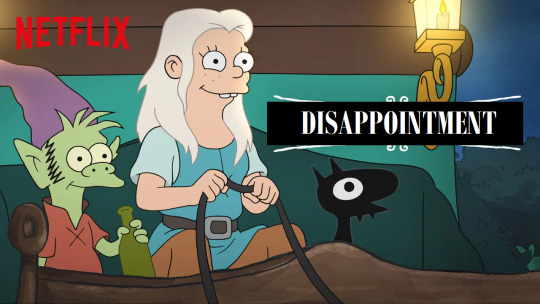
Matt Groening is an Ideas Man. Life in Hell, The Simpsons, Futurama, it’s not often that a single creative becomes the voice of more than one generation. And yet, his TV shows, at the height of their respective successes, were not identifiable by Groening’s direct influence so much as they were their fantastic team of writers. At their apex, Groening’s greatest successes were far bigger than Groening himself, and while he was adept at dreaming up the conceit and the characters of the worlds he created, it was on the back of the efforts of a fantastic writing team that his shows flourished. So while Groening’s typically warped and cynical worldview held his comic strip in good stead, his short-form, frame-by-frame method of joke-telling lacks the subtlety and nuance that a good story-writer can use to build to a punchline, or to thread its characters into the weave of its plot rather than just having them stick their heads through a door and utter a joke because it’s been five minutes and the egg-timer sitting by his computer has gone off. In saying that, his contribution here is in co-operation with one of The Simpson’s most acclaimed writers - Josh Weinstein - so I don’t really know where to start in trying to figure out exactly what happened in the production of Disenchantment to start it off on such a bad footing.
Disenchantment is a ‘Netflix Original’ - a brand I can’t help but instinctively flinch at the mere mention of. To be fair to Netflix, not all its releases under that title are trash - some are even straight-up excellent - but there are literally hundreds of Netflix Originals released all over the world, and when you have the money and ambition that Netflix has (or had) there’s going to be an inevitable temptation to throw shit at the wall and see what sticks. After all, Netflix is the bastion of those willing to settle for cheap thrills, rom coms, and anything that will drown out the deafening sound of existential dread reverberating around the inside of their skulls. Not the most discerning audience, is what I’m saying. And to be fair to Disenchantment, Groening’s writing only appears credited in the first episode (even though the symptoms of that writing appear throughout to various degrees throughout the series). But when you’ve only got ten episodes to make your mark, and your appeal is in part trading on the pedigree of a back-catalogue of seminal shows such as The Simpsons and Futurama, the bar you’ve got to leap is going to be higher than usual. Which is why it’s so baffling that the opening episodes of Disenchantment are just. so. bad.
Full disclosure - I barely got half way through the first episode before I gave up with a groan and a roll of the eyes and turned it off. I even called it ‘Disenchanted’ seven times in this review before I realised I was getting the title wrong. Perhaps I was projecting. The only reason I watched the rest of the series was so I could write this review in good faith. Characters bounce from scenario to scenario in a chaotic, everything-but-the-kitchen-sink fantasy world. The narrative almost invariably plays out in a ‘this happened, and then this happened, and then THIS happened’ format. Mediocre visual gags and one-liners are shoehorned into scenes with no care at to how relevant they are, or how they affect the pacing. Everything is overstated, lacking the finesse that the best episodes of The Simpsons or Futurama used to let their humour and emotion sneak up on the viewer and take them by surprise. It lacks the endearing characters, the contained and engaging storylines, and the genuine social commentary that both of its predecessors had. And on top of all this the animation is really, really cheap, meaning that my first impression was that it was as amateurish in its visuals as it was in its script.
Growing pains can be a passing thing. The first season of the American Office was mostly trash, as was that of Parks and Rec, as were the first few seasons of The Simpsons, and while the entry point into Disenchantment reeks like a teenager’s bedroom, with time and distance from the first episode it does open up in two something more engaging. But that doesn’t absolve it of its sins, as the budgetary and temporal constraints of the ‘Netflix Original’ title have clearly failed to let this series grow large enough to support the wide creative team it needs to even entertain thoughts of approaching its predecessor’s quality. Everything about Disenchantment feels impermanent compared to its predecessors - from the meandering and indefinable conceit, to the clutch of thinly-written characters, to the cheap, badly-written, throwaway jokes…it all feels like it wasn’t made to last beyond the initial ten episodes. It feels like a draft copy.
Which is a real shame, because Disenchantment is a vehicle for an excellent cadre of modern comedians and performers who simply haven’t got much to work with. Abbi Jacobson and Eric Andre both came from better, more ground-breaking shows to play far-less interesting characters. ‘He’s a demon, BUT HE’S KINDA CUTE!’; ‘she’s a princess, BUT SHE’S ALSO A ROUGH-AND-TUMBLE REBEL!’ The best a character can hope to be in this series is a thing that is also another thing, otherwise, they’re Kissy, the promiscuous elf. Or Weirdo, the sex pest elf. Or Shocko, the elf that expresses shock, and is legitimately the only joke I laughed at in the first episode by virtue of the fact that it was just so dumb. Below even that rung lay the characters that exist only as vessels for shitty end-of-scene one-liners, like the guy who walks through the door after the King has threatened to decapitate anyone who looks at his daughter, saying ‘oh boy, did I look at HER!’ Ugh.
And when the jokes aren’t content to simply be bad, they straight-up don’t make sense - a perfect example of this being when the princess’ betrothed accidentally impales his head on a sword.
Let’s break it down:
- A prince drops the ring during his wedding ceremony, and when bending to pick it up accidentally impales his head on a sword. The joke being that a character is suddenly killed in an unexpected way. This is mildly amusing.
- A member of the court declares him dead. To which the prince replies with the garbled mess of a line: 'Ah, I think I’m alive. No, wait, never mind.’ He then slumps down dead. Aside from not being as funny as the first joke, in showing the price to be alive it undoes the punchline of the first joke. ‘Prince has an accident and lives’ is not funny. ‘Prince has an accident, seems to live, but doesn’t’ is also not funny.
- Finally, after two increasingly poor gags that both rely on the prince’s death to even be considered jokes at all, the scene moves on for around a minute before the prince opines the fact that no-one is helping him. Not only does this YET AGAIN render the two previous jokes moot (’Visibly alive man turns out to be alive’), it just plain doesn’t make any sense. The joke was that he died. Twice. Why would anyone be expected to help him? Did they forget to take this out of the script? Or did they just forsake consistency and the internal logic of their show so they could cram as many shit gags in as possible?
In two minutes we have three crappy bits that are all essentially the same joke, each one simultaneously worse than the last AND retroactively rendering the jokes before it less funny. To be honest, I’m kind of impressed. It’s almost the perfect, literal, anti-comedy. And it’s the norm, rather than the exception, for the first few episodes at least. Any time the show starts to get any steam up and you allow yourself to be invested, some kind of desperate, tone-deaf non sequitur swings in and ruins your mood. The best jokes in the series are either less-painful versions of this, or the occasional rare gem that is both unexpected AND YET makes sense for the scene. When the king laments that he can’t possibly lose anything else, and then his crown slips off his head and plunges over the railing of his tower, THAT’S funny. In the moment, I laughed out loud. And it’s not even that spectacular a joke. But it’s sadly among the best that Disenchantment can offer.
I’ve got a real bone to pick with Netflix’s ‘Originals’. If you ever held hope that one day down the track the channel’s trashheap would be thinned out, or somehow transformed by the platform’s success, then one five-minute wade through the collection will convince you that this is a pipe-dream. It’s an endless sea of low-budget, thrown-together mediocrity that seriously suggests the person greenlighting these things needs to have their rubber stamp confiscated. Disenchantment grows on you, and by episode ten you might even find yourself a little bit invested. But big picture, the series is just another idea flung at a wall and failing to stick. The potential is there, I suppose, and I can only hope that the upwards momentum carries over to the newly-commissioned second season, but the low quality animation and poor execution just pulls the rug out from under it. Groening’s style is best suited to self-contained episodes that allow the writers to condense the humour; a ten-episode arc with a flimsy plot is not fertile ground for a style of show that needs time to find its feet and settle into the premise and the characters. And while it might amuse you if you hang around long enough, I don’t really feel like awarding points to a show for being kind of worth it eventually. Disenchantment simply doesn’t hold a candle to the best of Groening’s works.
5/10
#disenchantment#matt groening#animation#simpsons#futurama#luci#bean#televition#review#tv#netflix#streaming#on demand#cartoon#fantasy#elves#eric andre#abbi jacobson
0 notes